#interview translations
Explore tagged Tumblr posts
Text
DOGMA book: member interview translations
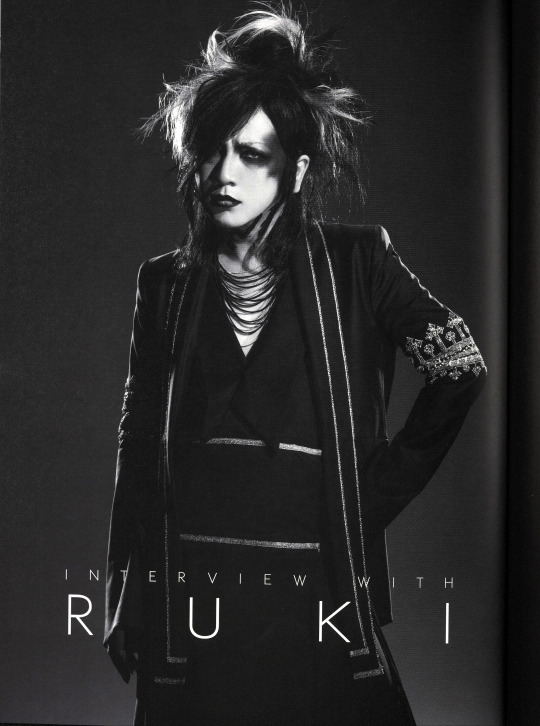
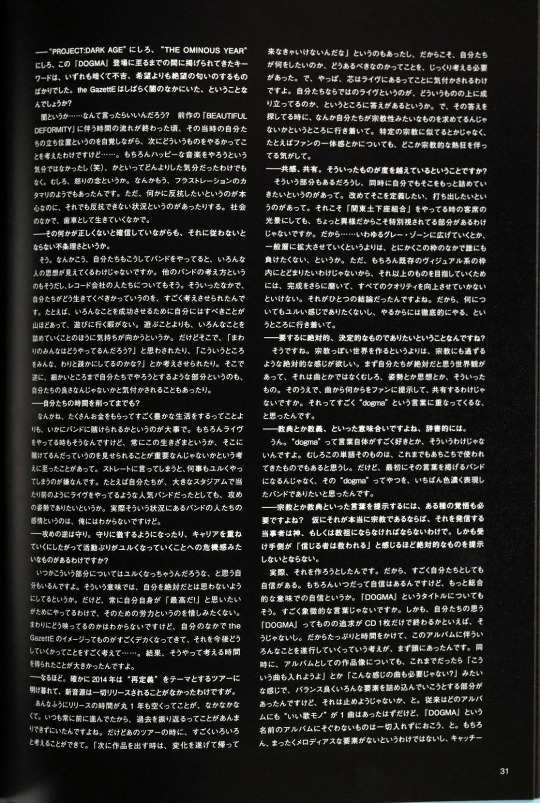
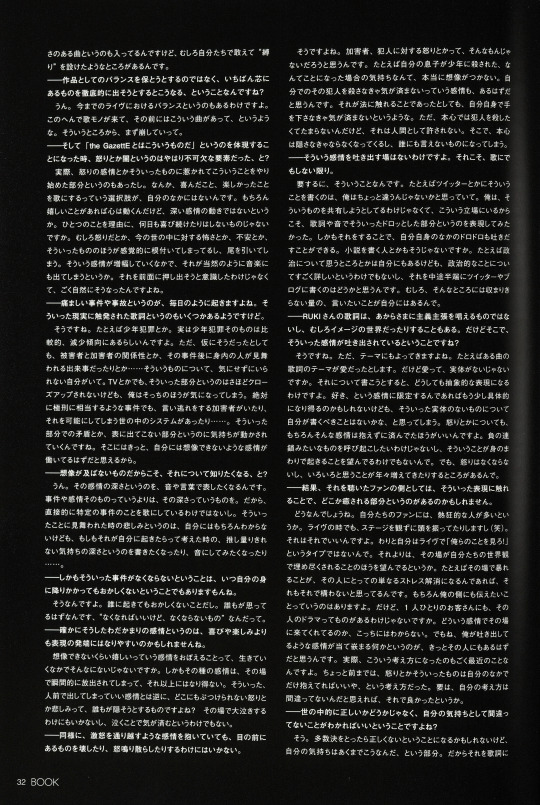
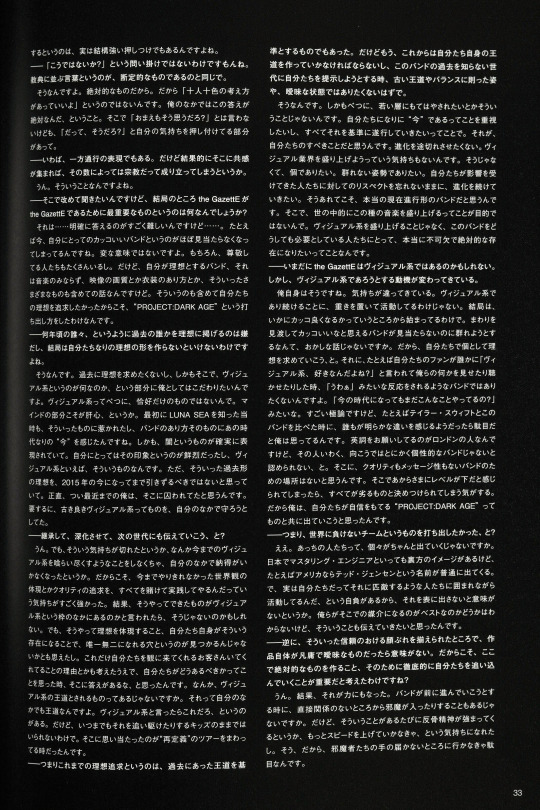
Interviewer: The keywords associated with "PROJECT: DARK AGE" and "THE OMINOUS YEAR," leading up to the release of "DOGMA," have all been gloomy, exuding a sense of despair rather than hope. Does this mean that the GazettE has been dwelling in darkness for a while?
Ruki: Rather than darkness...how should I put it? By the time the flow of time associated with our previous work "BEAUTIFUL DEFORMITY" had ended, we became aware of our standing and began thinking about what to do next. We weren't in the mood to create happy music (laughs), but we also weren't feeling gloomy. It was more like a sense of anger—a bundle of frustration. We are genuinely rebellious at heart, yet there were circumstances where we couldn't rebel, living as cogs in society.
Interviewer: You mean the absurdity of knowing that something is wrong but still having to comply with it?
Ruki: Exactly. As we continued our band activities, we encountered various people's thoughts—those of other bands and people from record companies. This made us reflect on how we should live. For instance, to achieve various successes, I had countless responsibilities and no time for leisure. My focus shifted more towards cramming in various tasks rather than having fun. But then, I'd wonder, "How does everyone else manage?" and consider if others might be neglecting such details. This made me realize that our meticulousness might actually be one of our strengths.
Interviewer: Even at the cost of sacrificing your own time?
Ruki: Instead of living a wealthy life with lots of money, it's more important for us to see how much we can dedicate to the band. Of course, this applies to when we are performing live as well, but it's crucial to show that we are betting everything on this lifestyle. I hate doing things half-heartedly. Even if we were a popular band performing in large stadiums, I'd still want to maintain an aggressive stance. Although I can't speak for the feelings of bands in that situation.
Interviewer: The opposite of aggressive is defensive. Do you have a sense of crisis about becoming complacent in your activities as your career progresses?
Ruki: There's a part of me that thinks we might eventually become more relaxed about these aspects. In that sense, I try not to think of myself as absolute. However, I do everything to feel that "we're the best!" and I don't want to spare any effort to achieve that. I don't know how others perceive it, but the image of the GazettE has grown significantly in my mind, and I have been thinking a lot about how to shape it in the future. Having time to think about it was very significant.
Interviewer: Indeed. In 2014, you were busy with a tour themed "redefinition," without releasing any new material.
Ruki: Having a whole year without a release was unusual. We were always moving forward and didn't have much time to look back. But during that tour, we could think about many things. There was a sense that when we released our next work, we had to come back changed. Therefore, we needed to think carefully about what we wanted to do and how we should be. Eventually, I realized that our core lies in live performances. The essence of our live shows is built upon something unique to us. While searching for that answer, I felt like we were seeking something akin to religiosity—not resembling any specific religion but perhaps related to the fervor of our fan unity.
Interviewer: Do you mean the degree of empathy and collective feeling beyond normal bounds?
Ruki: There might be some of that, but I also want to delve deeper into it. I wanted to redefine and present it anew. Even the sight of the audience during "Kantou Dogeza Kumiai" was extraordinary and special. So, instead of expanding into a gray zone or appealing to a broader general audience, we wanted to be unbeatable within our niche. But we don't intend to remain confined within the existing visual kei boundaries; we aim to elevate everything beyond that. That's one of our conclusions. We don't want to be lax about anything and strive to do everything thoroughly.
Interviewer: In other words, you want to be absolute and definitive.
Ruki: Yes. Rather than creating a religious-like world, we want an absolute feeling that also resonates with religious undertones. We have an absolute worldview that we believe in, and it involves attitudes and ideologies rather than just songs. We then present and share everything with our fans. That overlaps significantly with the word "dogma."
Interviewer: In the dictionary, it means doctrine or creed.
Ruki: I don't particularly love the word "dogma" itself. It's been used in many places before. But instead of being the first band to use the term, we wanted to be the band that expressed "dogma" most profoundly.
Interviewer: Using words like religion and doctrine requires a certain determination, doesn't it? If it were a real religion, the proponents would need to be gods or prophets, presenting something absolute for followers to believe in.
Ruki: We actually tried to create that. So, we're very confident in ourselves. Of course, we've always been confident, but this is more about a comprehensive confidence. The title "DOGMA" is very symbolic. And the pursuit of what we think "DOGMA" should be is not limited to just one CD. We planned to take our time to carry out various things associated with this album. At the same time, regarding the album's composition, we used to aim for a balanced inclusion of various elements, like "let's include this type of song" or "we need a song like this," but we decided to stop that. Previously, each album had at least one "good song," but for an album named "DOGMA," we decided not to include anything that didn't fit. Of course, it's not that there are no melodic or catchy elements at all...
Ruki: We have included songs with depth, but it's more like we deliberately set a 'rigidness' to it.
Interviewer: So, instead of maintaining balance within the work, you focused on thoroughly expressing the core element?
Ruki: Yes. There's always a balance in our live performances, like having a song come in at a certain point, or placing a specific type of song before another. We started by breaking away from that.
Interviewer: And when it came to embodying "this is what the GazettE is," anger and darkness were indeed essential elements?
Ruki: In reality, part of the reason we started doing this was because we were drawn to emotions like anger. Somehow, I don't have the option in myself to turn happy things or enjoyable things into songs. Of course, if something makes me happy, my heart moves, but it's not a deep emotional movement, you know? You don't stay joyful for days over one thing. Instead, anger, fear of the current world, and anxiety tend to root themselves deeply and linger. As these emotions amplify, they naturally emerge in the music, not because I consciously decided to push them to the forefront, but because it just naturally turned out that way.
Interviewer: There are tragic incidents and accidents occurring daily. Some of your lyrics seem inspired by such realities.
Ruki: Yes. For example, juvenile crime. Apparently, juvenile crime itself is relatively declining. However, regardless of that, there's a part of me that can't help but be concerned about things like the relationship between victims and perpetrators, or the incidents where family members are affected afterwards... Even though such aspects aren't often highlighted on TV, they catch my attention. Even in cases where there should absolutely be severe punishment, there are perpetrators who manage to evade responsibility, or there are systems in society that allow such things to happen... Such contradictions and hidden aspects move me emotionally because there are likely feelings involved that I can't even imagine.
Interviewer: Because you can't imagine them, you want to understand them?
Ruki: Yes. I want to express that depth of emotion through sound and words. It's not about the incident or the emotion itself, but the depth of it. Therefore, I'm not singing about specific incidents directly. While I can't understand the sadness faced by those affected, imagining it happening to me makes me want to express that depth of emotion and translate it into music.
Interviewer: And the fact that such incidents don't stop means it could happen to anyone, including yourself.
Ruki: Exactly. It can happen to anyone. Everyone must think, "It would be great if these things didn't happen, but they don't stop."
Interviewer: Indeed, those lingering feelings are easier to use as a starting point for expression compared to joy or pleasure.
Ruki: We rarely feel joy so intense it's hard to imagine in our lives. Such feelings are often momentarily released and don't go beyond that. On the opposite, anger and sadness that can't be directed anywhere are feelings everyone tries to hide. You can't burst into tears on the spot, and crying doesn't necessarily make you feel better.
Interviewer: Similarly, even if you harbor feelings of intense anger, you can't go around breaking things or shouting loudly.
Ruki: That's right. The anger towards the perpetrator or the criminal is not something trivial. For example, if my son were killed by a juvenile, I can't even imagine what kind of feelings I'd have.
I think there would be a feeling of needing to kill the perpetrator myself to feel satisfied. Even if that meant breaking the law, the feeling of needing to take matters into my own hands. However, while I might desperately want to kill the criminal in my heart, that's not something allowed for a human. Therefore, these dark feelings have to be hidden and can't be shared with anyone. Unless they're expressed through a song.
In short, that's what it is. For example, I don't think it's appropriate to write about such feelings on Twitter. I'm not trying to share those feelings with others; instead, from my position, I wanted to express those dark feelings through lyrics and sound. And by doing so, I can also expel the murkiness within myself. It's similar to how someone who writes novels might feel. For instance, I have my own thoughts on politics, but I'm not deeply knowledgeable about it, so I don't think it would be right to write about it half-heartedly on Twitter or a blog. Rather, I have a lot of things I want to say that wouldn't fit in such places.
Interviewer: RUKI-san's lyrics aren't explicitly advocating any particular ideology; sometimes it's about the world of imagery. However, that's where those emotions are being expelled, right?
Ruki: That's right. However, it depends on the theme as well. For example, if the theme of a song's lyrics is love. But love isn't tangible. When you try to write about it, it inevitably becomes abstract. If it's limited to the feeling of liking someone, it might become a bit more concrete, but I feel like there's nothing for me to write about such intangible things. As for anger, it's better not to have such feelings. I don't want to evoke a chain of negative events, and I don't wish for such things to happen around me. But anger doesn't go away, and I find myself feeling it more and more each year.
Interviewer: As a result, fans who listen to your music might find some form of healing through those expressions.
Ruki: I wonder about that. Many of our fans are quite enthusiastic. At our live shows, some don't even look at the stage and just headbang (laughs). That's fine. I'm not the type to shout, "Look at us!" during live performances. Rather, I prefer for the atmosphere to be filled with our worldview. For example, if someone releases their stress by going wild at our concerts, that's fine with me. Of course, I have things I want to convey too. But each fan has their own story. We don't know what emotions they bring with them to our concerts. But I think there's something in my emotions that resonates with each of them. I've only recently started thinking this way. Until a while ago, I thought it was enough to just keep the anger and such feelings within myself. As long as I felt my thinking wasn't wrong, that was enough.
Interviewer: It's not about being right by societal standards, but understanding that they are not wrong as your own feelings, right?
Ruki: Exactly. It might not be correct if you take a majority vote, but these are my feelings. So putting those feelings into lyrics is actually quite a forceful imposition.
Interviewer: It's not a question of "Isn't it like this?" It's more of a definitive statement, like words in a sacred text.
Ruki: That's right. It's because it's absolute. So it's not about "There are various ways of thinking." For me, this is the definitive answer. I'm not saying, "You should feel the same," but rather, "This is how it is for me."
Interviewer: So it's a one-way expression. But if it gathers enough empathy, it could even form a kind of religion.
Ruki: Yes, that's right.
Interviewer: So I'd like to ask again, in the end, what is the most important thing for the GazettE to be the GazettE?
Ruki: That's... it's really difficult to answer clearly... For example, right now, I don't find many bands that I think are cool. I don't mean that in a bad way. Of course, there are many people I respect. But the ideal band I envision, which includes not just the music but also things like the quality of the visuals and the way they dress, those elements combined, that's what I wanted to pursue, which led to the "PROJECT: DARK AGE" approach.
Interviewer: You don't want to idealize someone from the past, you have to create your own ideal form.
Ruki: That's right. I don't want to seek ideals in the past, and I want to focus on what visual kei really means. Visual kei isn't just about looks; it's about the mindset. When I first discovered LUNA SEA, I was drawn to those aspects and felt the "now" of that era in their band style. Moreover, they definitely expressed darkness. That impression was vivid for me, and that's what visual kei means to me. But I don't think we should cling to those past ideals in 2015. Honestly, until recently, I was probably trapped by that. I was trying to preserve the old-school visual kei within myself.
Interviewer: To inherit, deepen, and pass it on to the next generation?
Ruki: Yes. But I felt that I had to devour the visual kei of the past in order to be satisfied within myself. Therefore, I had a strong feeling of embodying the world view and pursuing quality that I hadn't been able to fully realize before. As a result, if you ask whether what we created falls within the bounds of visual kei, it might not. But by embodying those ideals and becoming such a presence ourselves, I felt we might find a unique position. Thinking about why so many people come to see us, I felt the answer was there. There's a traditional idea of what visual kei is supposed to be. For me, that's also the standard. When you think of visual kei, there's an image. But we can't remain kids chasing that image forever. This realization hit me while we were on the "Redefinition" tour.
Interviewer: So the pursuit of ideals so far was based on the classic model of the past. But now, you have to create your own ideal path and present yourselves to the generations who don't know your past. You can't stay in an old, balanced, or vague state.
Ruki: That's right. And it's not about wanting to be popular with younger audiences. We want to emphasize "now" in our own way and proceed with everything based on that. I think that's what we should be doing. We don't want to stop evolving. We're not trying to revitalize the visual kei industry. It's not about that; we want to be individuals. We want to maintain a stance of not blending in. We want to continue evolving without forgetting the respect we have for those who influenced us. Only by being like that can we be a truly current band. The goal is not to uplift this genre of music for the world. Instead, we want to become an indispensable and absolute presence for those who need us.
Interviewer: The GazettE might still be visual kei, but the motivation for being visual kei has changed.
Ruki: For me, it has. My feelings have changed. We're not focusing on continuing as visual kei. Ultimately, it started from wanting to be cool. Looking around, I don't see any bands that I think are cool, so it would be strange to try to blend in. So, we decided to seek our ideals as individuals. Also, when our fans show someone our music and say they like visual kei, I don't want the reaction to be "Wow." Are they still doing this in this era?" For example, and it's an extreme example, but if you compare us to Taylor Swift, I don't want there to be an obvious gap.
Our English lyrics are done by someone in London, and they say that over there, bands need to be unique to be recognized. If the quality and message of a band aren't apparent, there's no place for them. If it's clearly felt that our level is lower, everything will be dismissed as inferior. So we decided to go all out with "PROJECT: DARK AGE," creating something we could be confident in.
Interviewer: So you wanted to present a team that could compete with the world?
Ruki: Yes. Over there, each individual stands out. In Japan, mastering engineers are seen as behind-the-scenes, but in America, names like Ted Jensen are well-known. We work surrounded by people who are on par with them, and we want to show that. Whether we're the best intermediary for that is uncertain, but that's what we wanted to convey.
Interviewer: On the other hand, even if you have a reliable team, if the work itself is mediocre or vague, it means nothing. So, creating something absolute and pushing yourselves to the limit was crucial.
Ruki: Yes. As a result, it became our strength. When a band tries to move forward, obstacles sometimes come from unrelated places. But each time that happened, our rebellious spirit grew, making us want to speed up even more. We need to reach a place where those obstacles are no longer a concern.
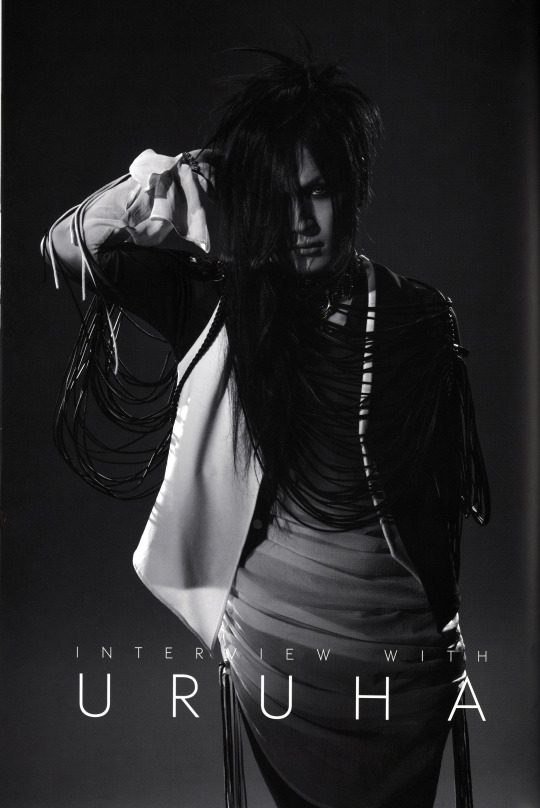
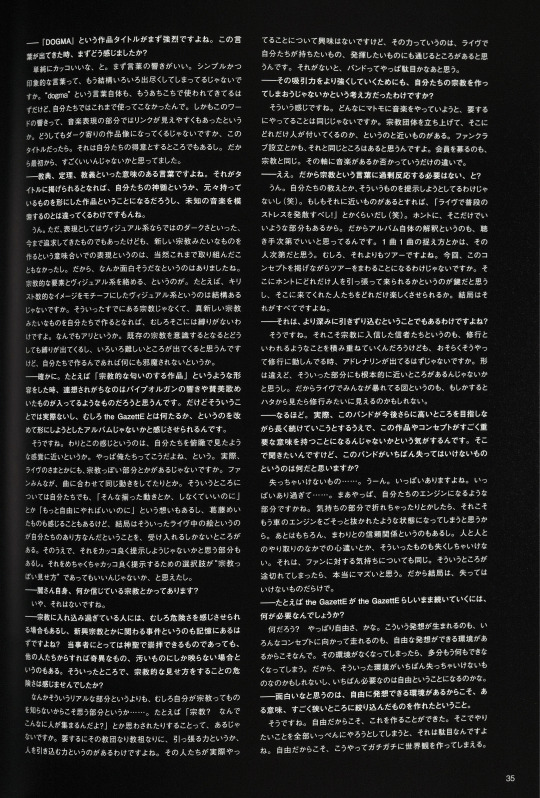
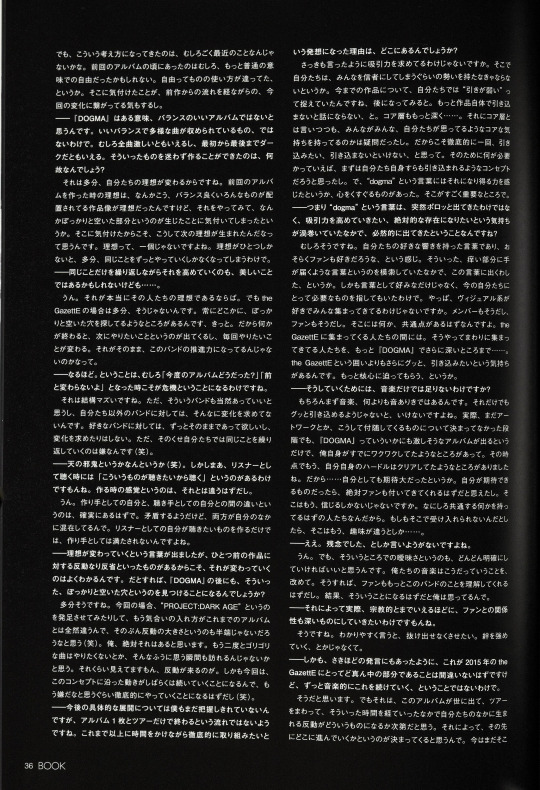
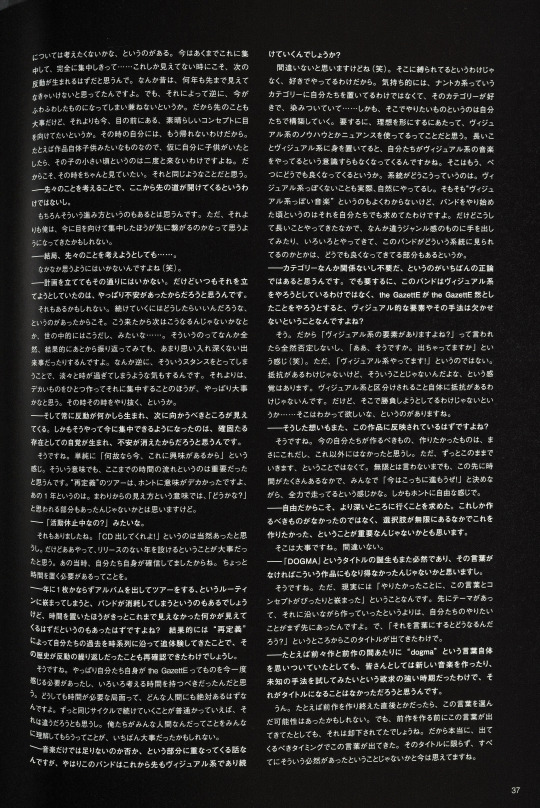
Interviewer: The title of your work "DOGMA" is quite striking. How did you feel when you first heard it?
Uruha: I simply thought it was cool. First of all, the sound of the word is good. Simple and impactful words have mostly already been used, right? Although the word "dogma" itself has already been used in many places, we hadn't used it before. The sound of this word links well with musical expression. If we use this title, the work inevitably has a darker tone. That aligns with our strengths. So, from the start, I thought it was a great idea.
Interviewer: It's a word that means creed, doctrine, or principle. Having it as a title implies that the work embodies your essence or what you've always had, rather than exploring unknown music.
Uruha: Yes. The darkness typical of visual kei that we've always pursued is part of it, but expressing the creation of a new religion is something we hadn't tackled before. So, it seemed interesting. Combining religious elements with visual kei. For example, there are quite a few visual kei bands that use Christian imagery as a motif. Instead of an existing religion, creating a brand-new one ourselves has a certain freedom. There are no constraints. If we were to be conscious of an existing religion, there would be limitations and difficulties, but if we create it ourselves, nothing gets in the way.
Interviewer: Indeed. When you describe a work as having a "religious feel," people might think of pipe organ sounds or hymn-like elements. But that's not the case here. Rather, it's an album that redefines what the GazettE is all about.
Uruha: Yes. It's like looking at ourselves from a bird's eye view. It's like, "Yeah, this is who we are." Even at our live shows, there are elements that seem religious. All the fans moving in unison with the music. Sometimes we feel, "You don't have to move like that," or "You could be more free." We feel a bit conflicted about it, but ultimately, we have to accept that this is our way. We think, "Let's present it in a cool way." So, choosing a "religious" presentation was one of the options to make it really cool.
Interviewer: Do you personally follow any religion?
Uruha: No, I don't.
Interviewer: For people who are overly devoted to religion, it can sometimes seem dangerous. We all remember incidents related to new religious movements. For the followers, it's sacred and worship-worthy, but for others, it can appear strange or dirty. Didn't you feel any danger in presenting things in a religious manner?
Uruha: Rather than those real aspects, it’s more about my own perspective since I don't really know much about religion. For example, "Why do so many people gather for this?" It's the pulling power of the sect or the leader. That power to attract people is something we want to have and show during our live performances. Without it, any band would be hopeless.
Interviewer: So, the idea was to create your own religion to strengthen that attraction?
Uruha: Yes. No matter how seriously you pursue music, it's essentially the same thing. It's establishing a religious group and seeing how many people follow it. Even starting a fan club is similar. Recruiting members is like a religion. The only difference is whether music is at the core.
Interviewer: So, there's no need to overreact to the word "religion"?
Uruha: Exactly. We're not trying to present any doctrines or teachings (laughs). If there's anything close to that, it would be something like, "You should vent your daily life stress at our live performances!" (laughs). That's really all there is to it. So, the interpretation of the album is up to the listeners. How they perceive each song is up to them. What's more important is the tour. We’ll be touring with this concept, and the key is how many people we can attract and how much we can entertain them. That's everything.
Interviewer: It also means drawing people in more deeply, right?
Uruha: Yes. Just like followers of a religion go through what they call training, producing adrenaline in the process. In a different form, but fundamentally similar. So, when people are going wild at our shows, it might look like training from an outsider's perspective.
Interviewer: I see. It feels like this work and concept will be crucial for the band to aim higher and continue for a long time. What do you think is the most important thing the band must not lose?
Uruha: The things we mustn't lose... there are many. Too many to count. The most important would be the parts that drive us. If we lose our passion, it would be like having our engine taken out of a car. Trust and relationships with those around us are also crucial. If our connection with the fans breaks, that would be really bad. So, there are many things we must not lose.
Interviewer: What do you think is necessary for the GazettE to continue being the GazettE?
Uruha: What could it be? Probably freedom. The freedom to come up with ideas and pursue different concepts is because of the environment we have. Without that environment, we wouldn’t be able to do anything. So, the most important thing might be freedom.
Interviewer: It's interesting that having an environment where you can think freely allowed you to create something very focused.
Uruha: Yes. Because we have that freedom, we could create this. Trying to do everything at once wouldn't work. Freedom allowed us to create a tightly focused world.
Uruha: But this way of thinking has only recently come about. During the previous album, the freedom we had was more in the ordinary sense. Our use of freedom was different. Realizing that change is part of the flow from the last work to this one.
Interviewer: "DOGMA" isn't a balanced album in the usual sense. It's not a collection of diverse songs with a good balance. Instead, you could say that every song is intense and dark from start to finish. Why were you able to create something like this without hesitation?
Uruha: That's probably because our ideals have changed. When we made the previous album, our ideal was to create a well-balanced work with various elements. But after doing that, we realized that it left an empty space. Noticing that gap led to the next ideal. Ideals aren't singular. If you only have one ideal, you'll end up doing the same thing repeatedly.
Interviewer: Continuously refining the same thing can be beautiful...
Uruha: Yes, if that's truly their ideal. But for the GazettE, I don't think that's the case. We're always looking for gaps, something missing. So, after finishing one thing, we always come up with the next thing we want to do. This momentum and constant change is what drives the band.
Interviewer: So, if people were to say, "How was the new album?" and the answer is, "It's the same as before," that would be a crisis.
Uruha: That would be quite bad. However, it's fine for other bands to stay the same. I don't demand change from bands I like. I want them to stay the same. But we don’t want to keep doing the same thing ourselves (laughs).
Interviewer: That’s quite contrary (laughs). As a listener, you listen to what you want to hear. But as a creator, it’s different.
Uruha: Yes. There's definitely a difference between my creator self and listener self. It may seem contradictory, but both coexist within me. Just creating what my listener self wants to hear doesn’t satisfy my creator self.
Interviewer: You mentioned changing ideals. It makes sense that reactions and reflections on the previous work lead to changes. So, after "DOGMA," will you find another gap?
Uruha: Probably. With "PROJECT: DARK AGE," we’ve put in an unprecedented amount of effort, so the reaction might be significant (laughs). I'm sure there will be moments when we think, "I don't want to do intense songs anymore." I can already see that reaction coming. And since we will continue with this concept for a while, we’ll likely feel fed up with it and be thorough to the point of exhaustion (laughs).
Interviewer: I don’t completely understand your future plans yet, but it seems like it won’t just be one album and a tour. You’re planning to take more time and be thorough.
Interviewer: What led you to this idea?
Uruha: As I said earlier, we’re seeking an attraction. We felt that we needed to have the momentum to turn everyone into believers. Looking back, we thought our previous works had a weak pull. We realized that if the work itself didn’t draw people in, it was pointless. We needed to attract our core audience more deeply. And even though we call them the core audience, we wondered if they all truly felt as passionately as we thought. That’s why we felt the need to draw them in thoroughly, at least once. To do that, we needed a concept that could captivate even ourselves. The word “dogma” had the power to do that. It had something that stirred the heart, which was crucial.
Interviewer: So, the word "dogma" didn't just pop up suddenly, but it came about naturally because you wanted to increase your attraction and become a definitive presence?
Uruha: Exactly. It’s a word with a sound we like and we thought the fans would like it too. We were searching for a word that could reach those sensitive spots, and we came across this word. It wasn’t just a word we liked; it also pointed to something we needed at the time. Everyone who likes visual kei gathered because of that. The band members, the fans, there’s a commonality among us. With “DOGMA,” we want to pull those who gather around the GazettE even deeper. We want to draw them in even more intensely than just within the circle of the GazettE. We want them to get to the core.
Interviewer: Does that mean that music alone isn’t enough to achieve this?
Uruha: Of course, music is the foundation. It must be compelling enough to draw people in on its own. Even before the artwork and accompanying elements were decided, the idea of releasing an album called "DOGMA," which seemed intense, already excited me. At that point, I had already cleared my own hurdle. So, I had high expectations. If it’s something I can look forward to, I’m sure the fans will follow. We have to believe in that. If it’s not accepted, then our tastes must be different...
Interviewer: Yes. it would be disappointing, wouldn't it?
Uruha: Yes. But I think it’s good to clarify any ambiguity. By reaffirming what our music is about, the fans will understand the band better. I believe that will be the result.
Interviewer: You want to deepen the relationship with the fans to the point where it could almost be called religious.
Uruha: Yes. To put it simply, I want to make them unable to escape. Not just strengthening the bond.
Interviewer: And as you mentioned earlier, this is definitely at the core of the GazettE in 2015, however, this doesn't mean it will continue like this musically forever.
Uruha: I think so. It depends on the reaction we get after this album is released and after the tour. It will depend on the reaction within ourselves during that time too. It will determine where we go next. Right now, it's still too early to say.
Uruha: I don't really want to think about it. Right now, I’m focusing completely on this, and when I’m entirely focused, the next reaction should naturally emerge. In the past, I thought I had to see several years into the future. But that can make the present feel insubstantial. While the future is important, I want to focus on the amazing concept in front of us now. We can't go back to who we were at that time. For example, a work is like a child; if I had a child, their early years would never come again. That’s why I want to be fully present at that moment. I think it’s the same thing.
Interviewer: Thinking about the future doesn’t necessarily open the path ahead.
Uruha: I think there's a way to move forward like that, of course. However, I've come to think that focusing on the present will connect to the future better.
Interviewer: Even if you try to think about the future...
Uruha: It doesn’t go as planned (laughs).
Interviewer: Even if you make a plan, it doesn’t go accordingly. But the reason you tried to plan was because of anxiety, right?
Uruha: That might be part of it. I was thinking about how to keep going. Like, since we came this far, what’s next, or considering the state of the world. But looking back, those events don’t end up being that meaningful. Taking that stance can make time pass by unremarkably. I think it’s more important to create something big and focus on it. To tackle each moment as it comes.
Interviewer: And by focusing on the present, some kind of reaction is always born, revealing the next step. It seems that now you can focus on the present because you've gained a solid sense of identity and the anxiety has disappeared.
Uruha: Yes. Simply put, it’s because “I’m interested in this now.” The flow of time up to this point has been important. The “redefinition” tour had a huge impact. That year was significant. From the outside, people might have wondered about it.
Interviewer: Like, “Are you on hiatus?”
Uruha: That was one reaction. People also probably said, “Release a CD!” But having a year without releases was important. At that time, we were convinced that we needed a break.
Interviewer: If you’re stuck in the routine of releasing an album and touring every year, the band might burn out. Taking time off can reveal things you hadn’t seen before. Through the “redefinition” process, you re-experienced your past chronologically and confirmed that your history was a series of reactions.
Uruha: Yes. We needed to review what the GazettE is and take time to think. Everyone has times when they need a break. Continuing in the same cycle indefinitely isn't normal. It was important for people to understand that we’re human.
Interviewer: This ties into whether music alone is enough. Will the band continue to be visual kei in the future?
Uruha: I think so (laughs). Not because we’re bound by it, but because we like it. We don’t see ourselves as fitting into a category; we just like visual kei and it’s ingrained in us. We use visual kei methods and nuances to realize our ideals. After being in visual kei for so long, we don’t even think of ourselves as playing visual kei music anymore. It doesn’t matter. We do things that don’t seem visual kei naturally. We initially sought that when we started the band, but over time, we’ve experimented with different genres. How people categorize us doesn’t matter anymore.
Interviewer: The ideal stance is that categories don’t matter and aren’t necessary. The band isn’t trying to be visual kei; rather, when the GazettE does what it does best, visual elements and methods are indispensable, right?
Uruha: Yes. So, when people say, “You have visual kei elements,” I don’t deny it. “Oh, really? That shows?” (laughs). But we’re not doing visual kei. There’s no resistance to it, but that’s not the point. I want people to understand that we’re not trying to compete within that framework.
Interviewer: That sentiment must be reflected in this work, too.
Uruha: Yes. What we should create and wanted to create is exactly this. But it doesn’t mean we’ll stay the same forever. While we may not have infinite time, we’ll decide together on the next direction and run towards it. And it feels really freeing.
Interviewer: It’s because of that freedom that you can go deeper. It’s not that this was the only thing you could create, but you chose this among infinite possibilities. That’s important.
Uruha: That’s crucial. No doubt.
Interviewer: The birth of the title “DOGMA” was inevitable, and without it, this work wouldn’t exist.
Uruha: Yes. In reality, it’s about fitting the word and concept to what we wanted to do. It’s not that we had a theme first and created around it, but rather what we wanted to do came first. Then we thought, “What word expresses this?” and that’s how we arrived at the title.
Interviewer: Even if you had thought of the word “dogma” between the previous albums, you were in a period of wanting to create new music and try unknown methods. So, it wouldn’t have been the title then.
Uruha: Yes. If we had finished the previous album and come up with this word, we might have chosen it. But if it had come up before making the previous album, it would’ve been rejected. It really appeared at the right time. I think everything had that kind of inevitability.
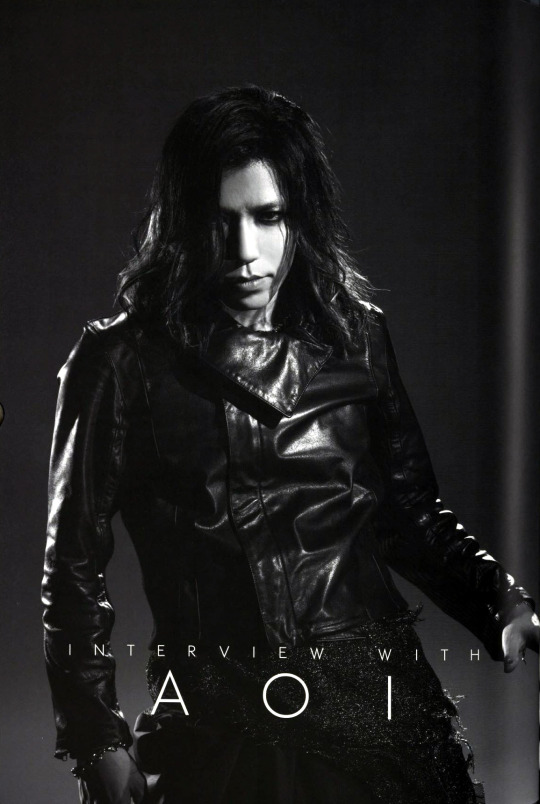
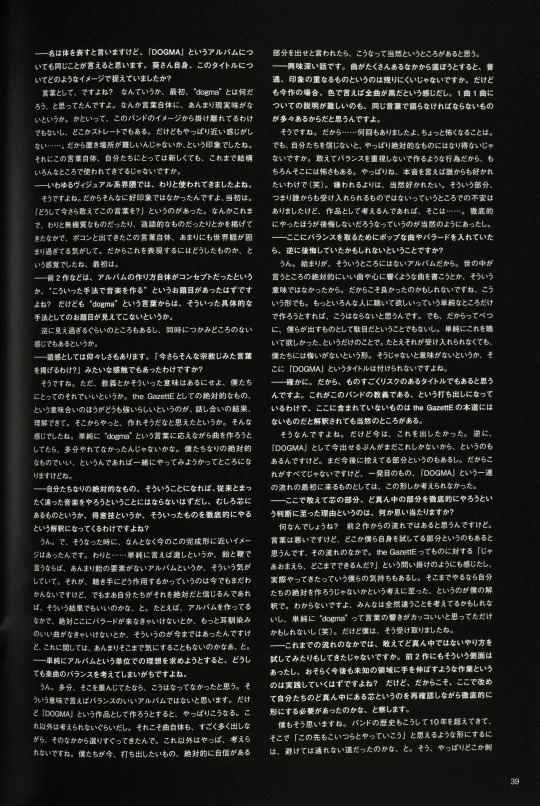
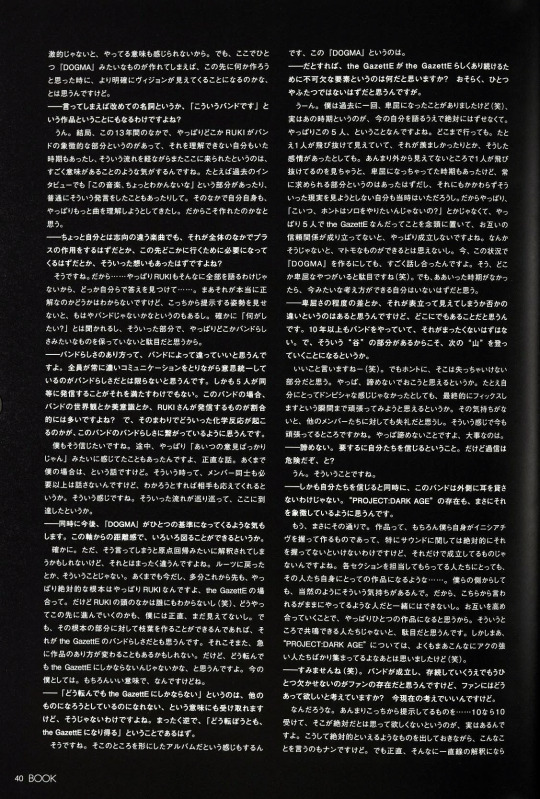
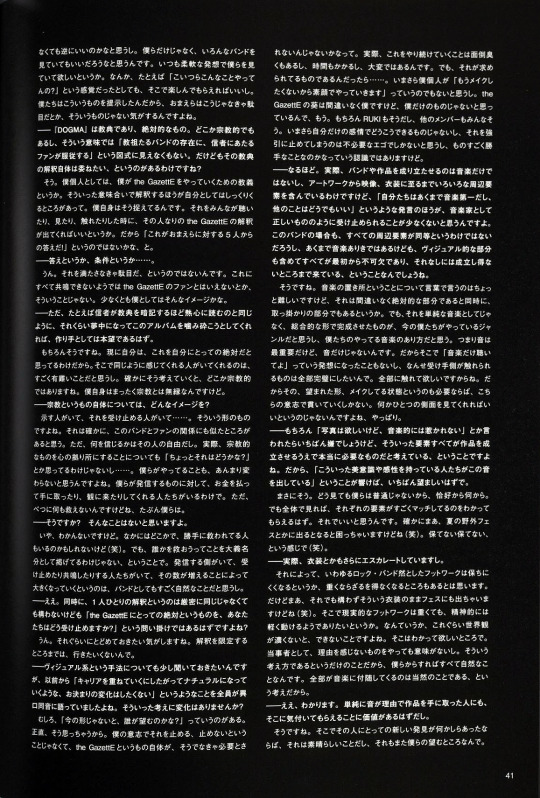
Interviewer: It’s often said that a name represents its essence, and I think the same can be said about the album "DOGMA." What kind of image did you have of this title, Aoi-san?
Aoi: You mean as a word, right? At first, I wondered, “What is 'dogma'?” The word itself didn’t feel very real to me. It wasn’t completely disconnected from the band’s image, but it also wasn’t straightforward. It didn’t quite fit comfortably anywhere. Also, while the word was new to us, it had been used in many contexts before.
Interviewer: It's been quite commonly used in the visual kei scene, hasn't it?
Aoi: Yes, exactly. So, initially, I didn’t have a great impression of it. I wondered, “Why use this word now?” There was that feeling. In our past works, we've often embraced somewhat impersonal or coined terms, and this word "dogma" appeared suddenly, with a worldview that seemed too fixed. At first, it was difficult to grasp how to approach it.
Interviewer: The previous two albums had a clear concept in terms of how the music was made, right? But with the word “dogma,” it’s hard to see a specific method or theme.
Aoi: It’s paradoxical. It’s both too clear and too elusive at the same time.
Interviewer: The word has a grandiose feel. Did it feel strange to use such a religious-sounding word now?
Aoi: Yes, but in our discussions, it became clear that it represented an absolute thing for us, something fundamental to the GazettE. Once we understood that, it started to feel doable. Simply creating songs that respond to the word “dogma” wouldn’t have worked. But if it’s about our absolute essence, then we could work with that.
Interviewer: Your own absolute essence. That wouldn’t mean creating completely different music, but rather, focusing on what you’re best at, right?
Aoi: Yes. When we thought of it that way, we started to see the final form of the album. It felt more intense, like there weren’t many sweet elements. We’re not sure how it will affect listeners, but if we believe in it absolutely, then that result is fine. In the past, we might have thought we needed a ballad or a more familiar song. But for this, we didn’t worry about that.
Interviewer: Usually, when striving for an ideal album, you tend to think about the balance of the songs.
Aoi: If we had focused on that balance, it wouldn’t have turned out this way. In that sense, it’s not a balanced album. But making it as “DOGMA” naturally led to this. We couldn’t imagine it any other way. We created many songs and carefully selected from them, which led to this result. This is what we wanted to showcase, with absolute confidence.
Interviewer: That’s an interesting point. Normally, when selecting from many songs, you avoid ones that overlap in impression. But in this case, all the songs feel dark, like they’re all black in color. It’s hard to describe each track individually because many are expressed in similar terms.
Aoi: Exactly. There were times when it felt a bit scary. But if you don’t believe in yourselves, it can’t become something absolute. Making an album without worrying about balance is inherently scary. We want to be liked rather than disliked, naturally. There was a fear that it wouldn’t be accepted, but as a work, it’s better not to have regrets. If we had added pop songs or ballads for balance, we might have regretted it.
Interviewer: So, if you had aimed to write universally good or heart-touching songs, it wouldn’t have turned out this way. But perhaps that’s why it’s good.
Aoi: Yes, the starting point wasn’t to write universally acclaimed songs. It was simply about what we wanted people to hear. Even if it’s not accepted, we have no regrets. Otherwise, we couldn’t have titled it “DOGMA.” It’s a risky title because it asserts our doctrine. If something isn’t included here, it’s not part of the GazettE’s core path.
Interviewer: It’s true. This title indicates that what’s included here is essential to the band. If it’s not included, it suggests it’s not part of the GazettE’s core.
Aoi: Exactly. But right now, this is what we wanted to release. We don’t have more to show for “DOGMA” at this moment. There’s more to come in the future, but for the first release in this series, this form is the only one we could think of.
Interviewer: What led you to the decision to focus on your core essence so thoroughly here?
Aoi: It’s hard to say. It’s a flow from the previous two works. There’s a part of us testing ourselves within that flow. It felt like a challenge to see how far we could go with the GazettE. If we were going to go that far, it made sense to establish our absolutes. That’s my interpretation. Others in the band might have different thoughts, maybe they just thought “dogma” sounded cool (laughs). But that’s how I took it.
Interviewer: In the past, you’ve deliberately tried different approaches, even in the last two albums. You’ll probably continue exploring new areas in the future. But it seems you needed to reaffirm and shape your core essence now.
Aoi: I think so too. The band has been around for over ten years, and to continue working together in the future, this was a necessary step.
Aoi: If it’s not intense, I can’t feel a reason to do it. But, I think that after we create something like “DOGMA,” then when we think about creating something in the future, our vision will become clearer.
Interviewer: So to put it bluntly, it’s like creating a noun again, it becomes a work that says "this is the kind of band we are," right?
Aoi: Yeah. Ultimately, over these 13 years, there were times when I didn’t quite understand RUKI's symbolic part of the band, but reaching this point now feels significant. For example, in past interviews, I’ve said things like, “I don’t really understand this music.” During that time, I tried to understand the songs more deeply. That’s probably why we were able to create this album.
Interviewer: Even if a song didn’t align with your own tastes, you believed it would add value to the whole, or it was necessary for where you were heading in the future, right?
Aoi: Yes, that's right. So... RUKI doesn't really explain everything, so we have to find answers ourselves... Whether those answers are correct or not is uncertain, but we need to show a proactive stance. If we don’t, we might not really be a band anymore. We do get asked, “What do you want to do?” and we have to maintain a sense of being a band.
Interviewer: What it means to be a band can differ. It’s not necessarily about everyone always having intense communication and unified intentions. In the case of this band, there are a lot of elements like the band’s worldview and aesthetics that RUKI transmits, right? And the chemistry that happens around that defines your band’s essence.
Aoi: I want to believe that too. Honestly, there were times when I felt like it was just about his opinions. That was just my perspective. At such times, the members don’t talk more than necessary to each other, but if you try to understand, the other person responds. It's that kind of feeling. Such a flow comes around, and that’s how we got here.
Interviewer: I also feel that "DOGMA" will become a standard to measure various things against in the future.
Aoi: Indeed. Saying that might be interpreted as a return to roots, but it’s completely different. It’s not about going back to our roots. It’s still about the present and, probably the future too. RUKI remains the core of the GazettE. But no one really understands what’s in RUKI's head (laughs), and I honestly don’t know how we’ll progress from here. However, if we can branch out from that core, that’s the essence of the GazettE. Our way of creating works might change. But no matter what happens, it will still be the GazettE. That’s what I believe now. In a good sense, of course.
Interviewer: When you say “it will still be the GazettE,” it could be taken as meaning that you can’t become anything else, but that’s not the case. It means that no matter how things turn, it will still be the GazettE, right?
Aoi: Yes. That’s how I feel about it.
Interviewer: So, what do you think are the essential elements for the GazettE to continue being the GazettE? I’m sure it’s not just one or two things.
Aoi: Hmm. There was a time when I was quite self-deprecating (laughs), but that period is essential to my current self. Ultimately, it’s about these five members, no matter what. Even if one person seems outstanding and I feel envious of that, or if there used to be such feelings. Even though there were times when I saw someone standing out who wasn’t very visible from the outside, there must have been a part that was always sought after, and yet at that time, I didn't try to see that reality. So, after all, it’s important to keep in mind that "this person doesn't really want to do it solo, do they?" and that it's really the GazettE with these five people, and it’s important for mutual trust to exist, or it just won’t work. Otherwise, I don’t think we can make anything decent. Even now, in this situation, when we were making "DOGMA," we talked a lot. Yes, it's no good if there’s someone who's a bit self-deprecating (laughs). But I think if there hadn’t been such a time, I wouldn’t have been able to think the way I do now.
Interviewer: Everyone experiences different degrees of self-deprecation, and whether it’s visible or not, it’s something that’s always there. After more than 10 years as a band, it’s natural to have such phases. Those “valleys” allow you to climb the next “mountains,” so to speak.
Aoi: You’re absolutely right (laughs). That’s something we shouldn’t lose. It’s about not giving up. Even if it doesn’t feel right for you personally, you push through until the final moment of fixing it. Without that mindset, it’s disrespectful to the other members. That’s what we’re working on now. It’s important not to give up.
Interviewer: Not giving up. Essentially believing in yourselves but being wary of overconfidence?
Aoi: Yes, exactly.
Interviewer: Moreover, while believing in yourselves, your band is not completely closed off to outside influences. The existence of “PROJECT: DARK AGE” symbolizes that.
Aoi: Exactly. While we take the initiative in creating our works, especially regarding sound, it’s not something we do alone. It becomes a project for everyone involved. We need people who can resonate with that. That’s what makes a work complete. Only with people who can elevate each other can we create something meaningful. However, with “PROJECT: DARK AGE,” I did feel like we gathered a bunch of strong personalities (laughs).
Interviewer: Another essential element for the band’s existence and continuity is the fans. What do you want from them? Just your current thoughts.
Aoi: What is it? I don’t want them to take everything we present as absolute. Even though we’re putting out something we consider absolute, I don’t want them to have a one-track interpretation.
Aoi: Even if they don’t take everything we put out as absolute, that might actually be a good thing. I think it’s fine if our fans also check out other bands, and view us with a flexible mindset. For example, even if they think, “What are these guys doing now?” I just want them to enjoy it. It’s not like we’re saying, “We’re presenting this, so you must accept it in a certain way.”
Interviewer: "DOGMA" is a sacred text, an absolute thing. It has a somewhat religious aspect. In that sense, it could be seen as the band being the leaders and the fans being followers. However, you want to leave the interpretation of that sacred text up to the fans, right?
Aoi: Exactly. Personally, I see it as a set of principles for me to continue being part of the GazettE. That’s how I interpret it, and it feels right to me. I think it’s great if everyone listens, watches, and engages with it in their own way and develops their own interpretation of the GazettE. So, it’s not like we’re saying, “This is the answer from the five of us to you.”
Interviewer: It’s more like a set of conditions, rather than an answer.
Aoi: Yes, and it’s not like if you don’t meet these conditions, you can’t be a fan of the GazettE. At least, that’s not my perspective.
Interviewer: But, like a devoted follower memorizing a sacred text, it would be ideal if fans get deeply engrossed in this album and try to fully understand it.
Aoi: Of course. Personally, I consider it my absolute truth. It’s very gratifying if there are people who feel the same way. In that sense, it is somewhat religious. Even though I am not religious at all.
Interviewer: What is your image of religion?
Aoi: There are those who show something, and there are those who accept it... It's that kind of thing, isn't it? Certainly, I think there are similarities to the relationship between this band and its fans. However, what one believes in is up to the individual. I don’t see anything wrong with people finding solace in something religious. What we’re doing isn’t much different. There are people who pay to take in what we put out. However, we probably can’t really save anyone.
Interviewer: You don’t think so? I believe you do.
Aoi: Well, I'm not sure. There might be people out there who feel like they've been saved in some way (laughs). But, we’re not doing this with the grand purpose of saving someone. There are creators who send out something, and there are people who receive it or resonate with it. The more people resonate with it, the bigger it becomes. That feels very natural for a band.
Interviewer: Yes. Each person’s interpretation doesn’t need to be exactly the same, but it is like asking, “How will you receive the absolute aspect of the GazettE?”
Aoi: Yes, I think that’s a good place to leave it. I don’t want to go as far as limiting interpretations.
Interviewer: I also wanted to ask a bit about the visual kei approach. Previously, you all mentioned not wanting to go down the predictable path of becoming more natural as you gain experience. Has that mindset changed?
Aoi: Not really. I think, “If we’re not like this, who would want it?” It’s not something I can just stop or continue on my own will. The GazettE needs to be this way to be necessary. Honestly, continuing this way is a hassle, time-consuming, and tough. But if it’s what’s desired… I can’t just say, “I don’t want to do makeup anymore, I’ll go natural.” Aoi from the GazettE is undeniably me, but it’s not just about me anymore. The same goes for RUKI and the other members. It’s not something I can change based on my own feelings, stopping it forcefully would just be selfish and unnecessary ego.
Interviewer: I see. Indeed, music alone doesn’t define a band or a work. There are many surrounding elements like artwork, videos, and costumes. Some may say, “We are purely about the music, everything else doesn’t matter,” and that might seem like the correct stance for musicians. However, for your band, while music is fundamental, all visual elements are essential too. Without them, it wouldn’t be complete.
Aoi: Exactly. It's hard to put into words, but while music is absolutely central, it’s also just the starting point. What we create isn’t just simple music; it’s a comprehensive form. Our genre and the way we make music are about completing this holistic form. Sound is crucial, but it’s not just about sound. We want everything the audience interacts with to be perfect. That includes the visuals and makeup, if it’s necessary for what’s desired. We’re not just about one aspect.
Interviewer: Of course, hearing someone say, “I like the photos but not the music” would be disappointing. But you believe all these elements are essential for the work to be complete, right? Ideally, the aesthetic and sensibility behind the music should resonate as well.
Aoi: Absolutely. We’re definitely not ordinary, from our looks to everything else. But if you see us as a whole, you’ll realize how all the elements match perfectly. That’s enough for me. Sure, it’s tricky for summer outdoor festivals and it’s hard to maintain (laughs).
Interviewer: Your costumes have become more elaborate too.
Aoi: It does make it harder to move like a typical rock band, heavier in a way. But we still go to festivals like this (laughs). Even if it’s physically demanding, I want to keep moving lightly in spirit. This kind of intense worldview is something you can’t achieve otherwise. As long as it feels justified, it’s meaningful for us. For us, it’s all natural. Everything naturally accompanies the music.
Interviewer: Yes, I understand. For people who initially pick up your work because of the music, noticing these elements is valuable.
Aoi: Indeed. If it leads to new discoveries for them, that’s wonderful and exactly what we hope for.
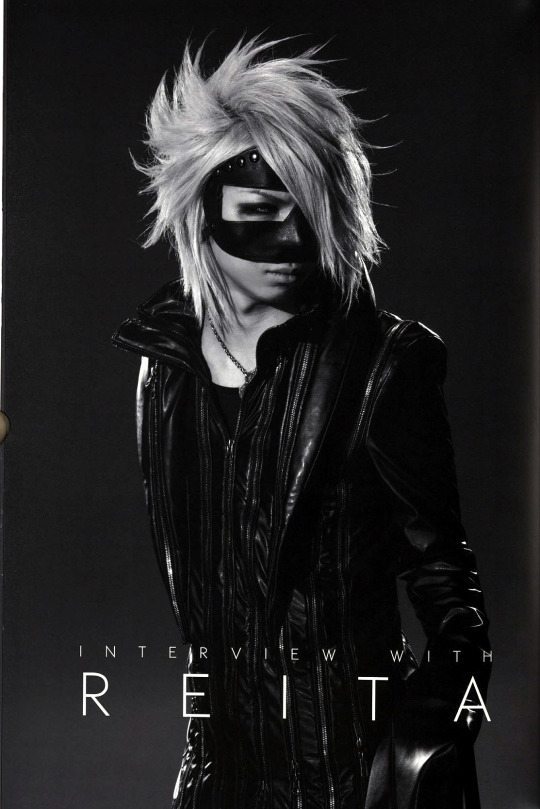
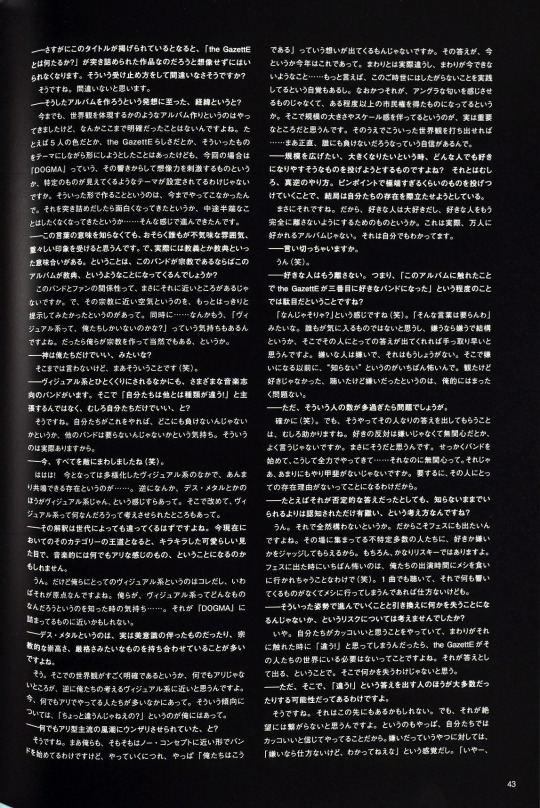
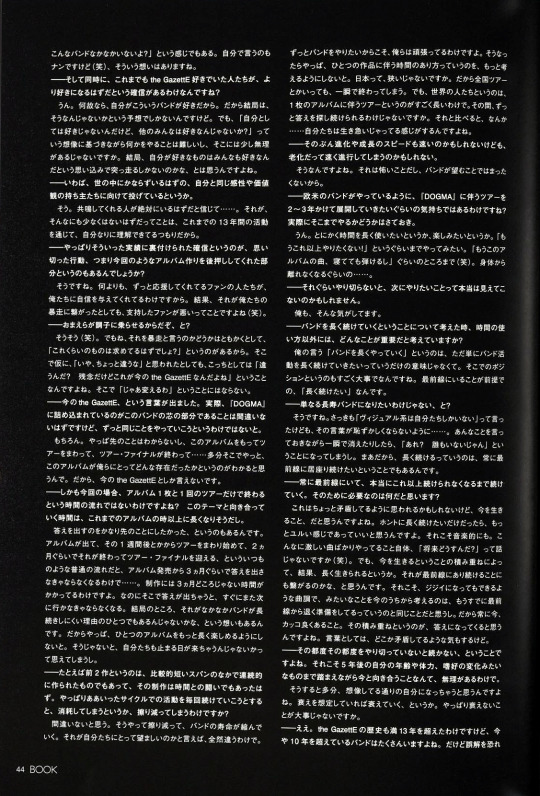
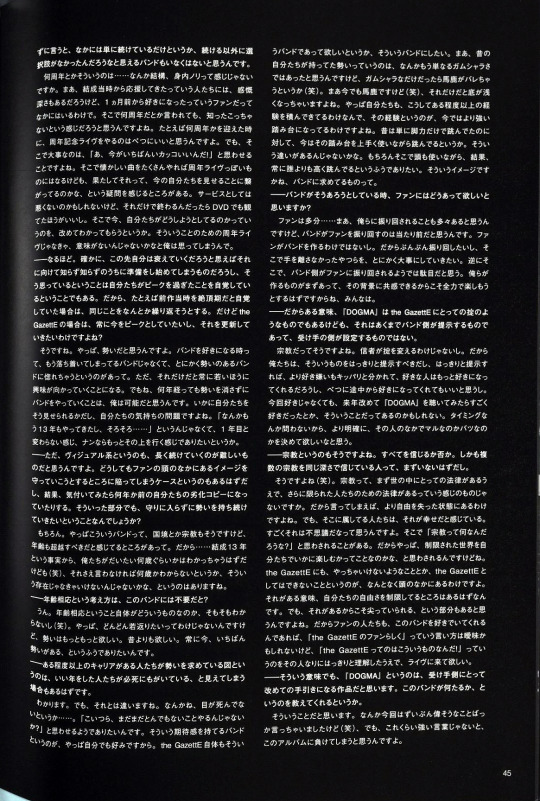
Interviewer: When you put out a title like "DOGMA", it’s inevitable that people will wonder, "What is the GazettE?" It makes you imagine that this work delves deeply into that question. Is that the correct way to perceive it?
Reita: Yes, I think that's right.
Interviewer: What led you to the idea of creating such an album?
Reita: Up until now, we've made albums that embody a certain worldview, but it's never been this clear. We've tried to shape things based on themes like the colors of the five of us or the essence of the GazettE. However, this time, with the theme of "DOGMA," the very sound of the word stimulates imagination and suggests a specific concept. We've never created an album with such a defined theme before. As we delved into it, it became more interesting and we didn’t want to do anything halfway. That’s how it progressed.
Interviewer: Even without knowing the meaning of the word, I think everyone will get a sense of a creepy, heavy atmosphere. And in reality, it means doctrine or scripture. So, if this band were a religion, would this album be its scripture?
Reita: The relationship between this band and its fans is quite similar to that, isn’t it? We wanted to clearly present that quasi-religious atmosphere. At the same time, we also feel like, "Are we the only ones left in visual kei?" If that’s the case, then it’s only natural for us to create our own religion.
Interviewer: Are you saying, "We are the only gods"?
Reita: I wouldn’t go that far, but yes, something like that (laughs).
Interviewer: There are various bands within the visual kei scene with different musical directions. Instead of asserting that "we're different from others," you’re saying it’s more like, "It's okay with just us"?
Reita: Yes, we feel that if we do this, we won't lose to anyone, and other bands aren’t necessary. That's how we feel.
Interviewer: Now, you've turned everyone into your enemies (laughs).
Reita: Hahaha! Given the diversity in visual kei today, there aren't many others we resonate with... To be honest, death metal seems more visual kei to me these days. It made me reconsider what visual kei really is.
Interviewer: That interpretation can differ by generation. Nowadays, the mainstream in that category might be characterized by a cute, sparkling look with an anything-goes musical approach.
Reita: Yeah. But for us, this is what visual kei is, and it's kind of our origin. It's how we felt when we first learned about visual kei... That might be close to what's packed into "DOGMA."
Interviewer: Death metal often accompanies an aesthetic sense, religious sublimity, and strictness.
Reita: Exactly. The clarity of that worldview, the fact that it's not just anything goes, is close to our idea of visual kei. Nowadays, there are many who do anything goes, but to me, that feels a bit off.
Interviewer: So, you were fed up with the mainstream trend of doing anything goes?
Reita: Yeah. Well, we started the band with a close-to-no-concept approach, but as we continued, the feeling of "this is who we are" emerged. That answer is what we have now. We are different from others, and we’re doing things that others can’t or wouldn’t want to do in this era. Moreover, it's not something that has a hint of the underground but rather something that has gained a certain level of acceptance. The scale and scope are important. By presenting such a worldview, I honestly believe we can’t be beaten.
Interviewer: When people aim to expand and grow, they mostly try to throw something that anyone can easily like, right? But you’re doing the exact opposite. By throwing something extremely pinpointed and extreme, you’re trying to highlight your own existence.
Reita: Exactly. So, people who like it will love it, and it’s meant to keep those who like us from ever leaving. This album isn’t something that everyone will like. I myself understand that.
Interviewer: You say that so definitively.
Reita: Yes. (laughs)
Interviewer: You want to ensure that those who like you will never leave. So, it’s not enough if someone listens to this album and thinks, "the GazettE is my third favorite band"?
Reita: "What's that?" That's the feeling (laughs). We don’t need such words. I know not everyone will like it, and if they hate it, that’s fine, as long as they come to their own conclusion. If someone dislikes it, that’s unavoidable. What’s most frightening is "not being known." Seeing but not liking, listening but hating, is not a problem for me.
Interviewer: Although, if too many people felt that way, it would be a problem.
Reita: True (laughs). But it helps to have people come to their own conclusions. They often say the opposite of love is not hate, but indifference. That’s exactly what I think. We started this band and have been doing our best... if people are indifferent, that’s unfulfilling. It means our existence doesn’t matter to them.
Interviewer: So even if the response is negative, being recognized is more important than being unknown?
Reita: Yes, I have no problem with it. That’s why I want to perform at festivals. Because there, a diverse crowd will judge if they like us or not. Of course, it’s risky. The scariest thing is people going to eat during our set. (laughs) If they listen to one song and then leave because they felt nothing, there's nothing you can do.
Interviewer: Didn't you consider the risk that pursuing this path might result in losing something?
Reita: No. If what we think is cool makes people think "that's.. different" then the GazettE doesn’t need to be in their world. That’s the answer. I don’t think we lose anything there.
Interviewer: But what if the majority ends up thinking "that's different"?
Reita: Yes, that might happen. But it won’t lead to despair. Because we believe what we’re doing is cool. To those who say they hate it, I’d just think, "If you hate it, that’s fine, but you don’t get it."
Reita: There aren't many bands like us, right? That's what I think. It might sound conceited (laughs), but that's how I feel.
Interviewer: And at the same time, you're confident that those who have liked the GazettE up until now will like you even more with this release, right?
Reita: Yes. Because I myself like bands like this. So, in the end, it's just my assumption. But it's hard to do something based on the idea, "I don't like it, but maybe everyone else will?" That just feels a bit forced. In the end, you have to run with the belief that what you like, everyone else will like too.
Interviewer: In other words, you're aiming at people out there who share the same sensibilities and values as you do.
Reita: Yes. I believe there are definitely people who will resonate with us. Through our 13 years of activity, I've come to understand that there are quite a few of those people out there.
Interviewer: Do you think that this confidence, backed by your past achievements, has pushed you to take bold actions, like making this album?
Reita: Yes. Above all, the fans who have supported us all along have given us the confidence. So even if that leads to us going a bit overboard, it’s the fans' fault for encouraging us. (laughs)
Interviewer: "It's your fault for getting us all fired up," right?
Reita: Exactly. (laughs) But, whether you call it overboard or not, we have a sense of "this is what you’re expecting from us, right?" So even if people think, "No, this isn’t it," we can say, "Too bad, but this is what the GazettE is now." We're not going to change just because of that.
Interviewer: You mentioned "the current GazettE." While it's clear that "DOGMA" represents the core of the band, you’re not saying you'll always do the same thing.
Reita: Of course. You never know what’s ahead. After we release this album, tour with it, and finish the final show, then maybe we'll understand what this album means to us. So, I can only say it's the current GazettE.
Interviewer: This time, it seems like the period you'll spend on this theme will be longer than usual.
Reita: We wanted to delay finding the answer a bit longer. Usually, after releasing an album, we start touring about a week later, finish it in two months, and reach the tour final. In such a typical flow, you end up having to find the answer within about three months from the album release. But making an album takes way longer than three months. If we have to find the answer in that short time, we have to move quickly. I feel that this is one reason why bands don't last long. We need to enjoy one album for a longer time. Otherwise, I feel like we might come to a stop.
Interviewer: For instance, the previous two albums were made in a relatively short span and were battles against time. Trying to keep up such a cycle might wear you down, right?
Reita: Definitely. You get worn out, and the band’s lifespan gets shorter. That's not desirable for us at all. We want to keep doing the band, that's why we work hard. So, we need to think more about the way we spend time on each album. Japan is small, so even a national tour ends quickly. But in other countries, the tours for one album last much longer. They keep searching for answers during that time. Compared to that, I feel like we’re rushing too much.
Interviewer: Your evolution and growth might be fast, but aging might progress quickly too.
Reita: Exactly. That’s scary, and not what we want at all.
Interviewer: Do you feel like you want to do a tour for "DOGMA" for 2-3 years, like bands in the West do?
Reita: Yes. I want to spend more time and enjoy it more. I want to do it until I feel like I can't do it anymore. I want to get to the point where I can play the songs in my sleep. (laughs) Until it sticks with me that much.
Interviewer: Maybe you won't see what you want to do next until you go all out like that.
Reita: I think so too.
Interviewer: When thinking about keeping the band going for a long time, what do you think is important aside from how you use your time?
Reita: When I say I want to keep the band going for a long time, I don’t just mean continuing the band's activities. The position we’re in is very important. I want to continue for a long time while being at the top.
Interviewer: You don’t just want to be a long-lived band?
Reita: Right. Like I said before, "there’s no one else in visual kei but us," and I don’t want those words to become embarrassing. If we say something like that and then disappear quickly, it would be like, "Oh? There's no one left." So, to continue for a long time means we want to stay at the forefront.
Interviewer: To always be at the forefront and continue until you really can't anymore. What do you think is necessary for that?
Reita: This might sound contradictory, but I think it’s living in the present. If you only want to continue for a long time, you could take it easy. Musically too. If we keep doing only intense songs, it's like, "What is there left to do in the future?" (laughs). But I think by living in the present, we can continue for a long time. That’s what keeps us at the forefront. If we start thinking about making songs that we can play even as old men, it’s like we’re already preparing to step back. So, always being cool in the present is important. That accumulation is the answer, I think. It might sound contradictory though.
Interviewer: If you don't give it your all each time, you can't keep going, right? Considering your age, physical strength, and preferences five years from now while facing the present is impossible. If you think like that, you might just become the person you imagine. Assuming you’ll decline and then changing things because of that. It’s important not to decline.
Reita: Exactly. The GazettE has been around for over 13 years now, and there are many bands that have been around for more than 10 years. But...
Reita: Honestly, I think there are some bands out there that are just continuing because they had no other choice..
Celebrating anniversaries and such can sometimes feel like an insider thing. Sure, there are those who have been supporting us since the beginning and might find it deeply moving, but there are also fans who just started liking us a month ago. For them, it might not matter if we say it’s our anniversary. For instance, having an anniversary concert is fine. But what’s important is to make people think, “Wow, they are at their best right now!” If we just play a lot of nostalgic songs, it might feel like an anniversary concert, but I wonder if it really shows who we are now. As a service, it might not be bad, but if that’s all there is, it might be better to just watch a DVD. An anniversary concert should be about showing who we are now, not just celebrating the past.
Interviewer: I see. Indeed, if you think you’re going to decline in the future, you might subconsciously start preparing for it, and thinking that way means you’re aware you’ve passed your peak. If you thought the last album was the peak, you might try to repeat the same thing. But for the GazettE, you always want now to be the peak, and you want to keep updating it, right?
Reita: Exactly. I think it’s about momentum. When you start liking a band, it’s not a settled band, but a band with a lot of momentum. If you only go for that, you’ll always be interested in the younger ones. But I think it’s possible to keep that momentum even after many years. It’s about how you present yourselves and your mindset. Instead of thinking, “We’ve been doing this for 13 years, maybe it’s time to…” we should have the same or even more energy than in the first year.
Interviewer: Continuing as a visual kei band is particularly difficult. There’s the risk of getting stuck trying to maintain the fans’ image of you, which could result in becoming a deteriorated copy of your past selves. You want to keep your momentum and not fall into that trap, right?
Reita: Of course. I think bands like us should transcend borders, religions, and even age. From the fact that we’ve been together for 13 years, people can guess our ages, but if we don’t mention it, they wouldn’t know. We shouldn’t be bound by the idea of acting our age.
Interviewer: So the concept of acting your age doesn’t apply to this band?
Reita: Exactly. I don’t even know what acting our age means. We don’t want to just get younger, but we want more momentum. More than before. We always want to be seen as having the most momentum right now.
Interviewer: To some people, seasoned bands trying to seek momentum might look like older folks desperately flailing.
Reita: I understand, but it’s different. It’s like our eyes aren’t dead. We want people to think, “These guys are still going to do amazing things.” I personally like bands that give you that feeling. I want the GazettE to be that kind of band. In the past, our momentum might have just been reckless, but being reckless alone reveals a lack of depth. Even now, we might still be a bit reckless, but we’ve gained a lot of experience that serves as a stronger base now. Before, we just jumped with leg strength, but now we use that base to jump even higher. We want to be the ones who always jump higher than anyone else, using both our heads and our experience.
Interviewer: When the band strives to be like that, how do you want the fans to be?
Reita: I think fans will often feel like they’re being dragged along by us, but I believe that’s natural. Fans don’t create the band. We want to keep swinging them around, and we want to cherish those who hold on. On the other hand, if the band gets swung around by the fans, it’s no good. We create something first, and people empathize with that and enjoy it fully.
Interviewer: In that sense, “DOGMA” is like a set of rules for the GazettE, but it’s the band that presents them, not the audience.
Reita: It’s like religion. Believers don’t change the rules. We should present them clearly, and if we do, it will be clear who likes and dislikes it, and those who like it will like it even more. It’s okay if people start liking us halfway through. Even if they don’t like it now, they might listen to “DOGMA” again next year and really like it. I want them to clearly decide if it’s a hit or miss for them.
Interviewer: That’s like religion too. You either believe everything or nothing. No one deeply believes in multiple religions equally.
Reita: Right. Religion has general laws and then additional laws for a limited group. It means you lose more freedom, but the people in it feel happy. It’s fascinating. I often wonder what religion really is. It’s about enjoying a restricted world in your own way. The GazettE also has things we shouldn’t do or can’t do as the GazettE. That might limit our freedom, but it also keeps us sharp. So if fans like this band, they should understand what the GazettE is and come to our concerts with that understanding.
Interviewer: “DOGMA” is a guide for the fans to understand what this band is all about.
Reita: I think so. I’ve been saying some pretty bold things, but we need strong words like this to match the album.
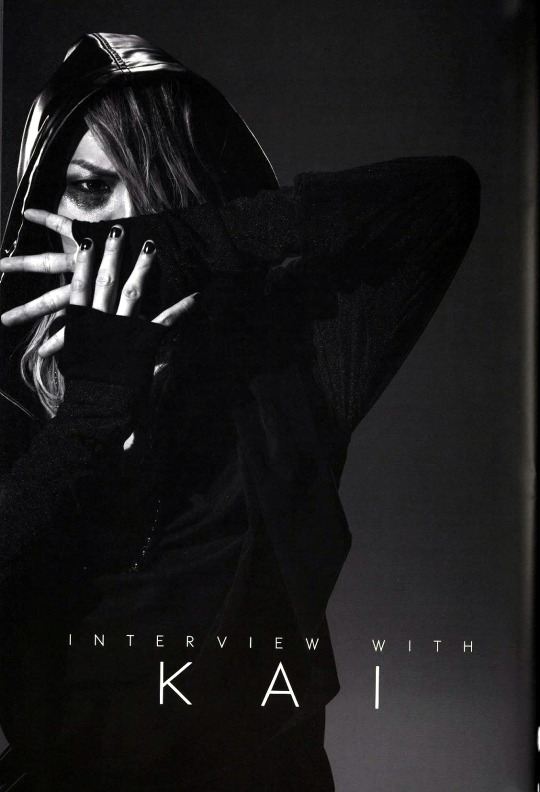
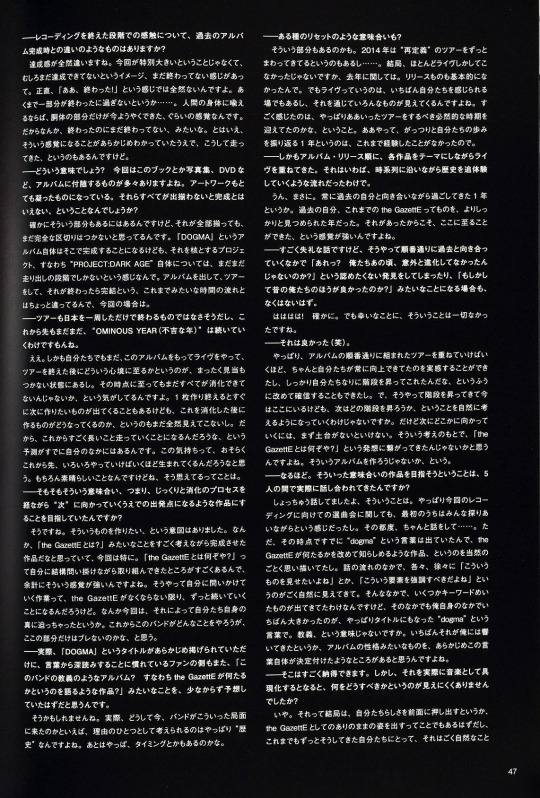
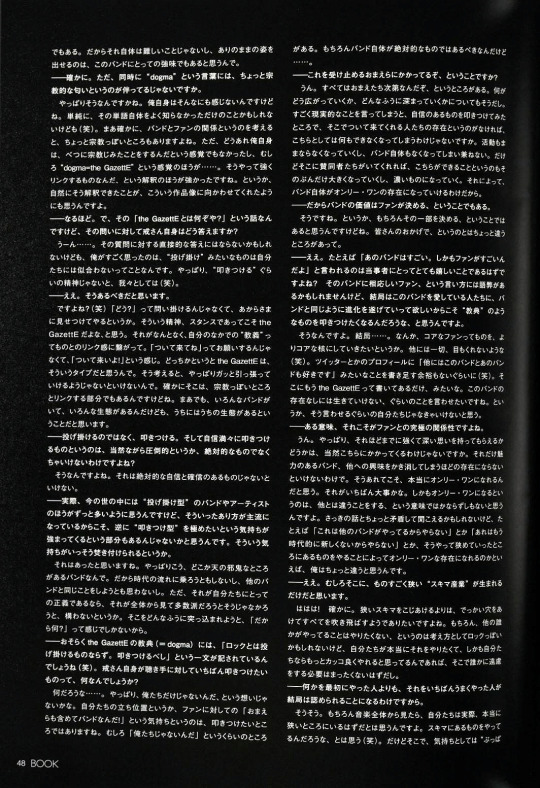
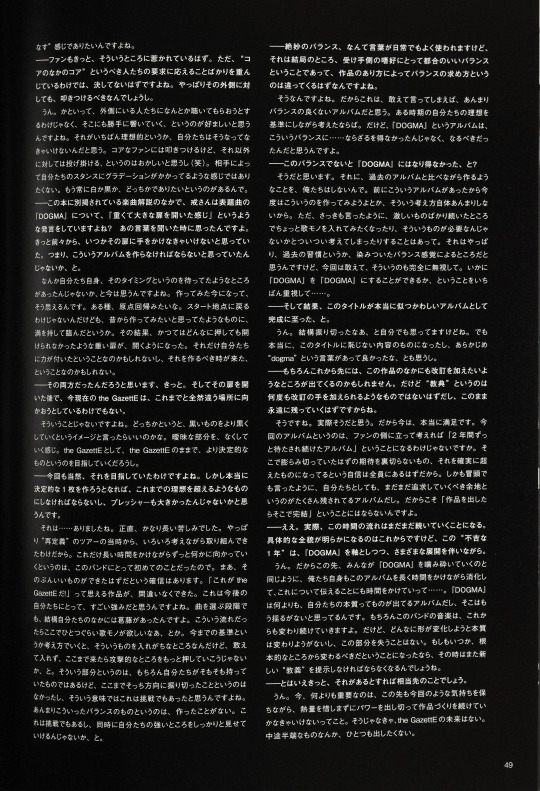
Interviewer: Looking back at the recording process, how does it compare to the completion of previous albums?
Kai: The sense of accomplishment is entirely different. It's not that this time is particularly significant, but rather that it feels like it's not quite finished yet. Honestly, it doesn't feel like a definitive "Ah, it's done!" moment at all. It feels like only a part of the process has been completed. To use a human body as a metaphor, it's like we've only just completed the torso. So, it's like we're finished, yet not finished. I was aware that I would feel this way from the start, and that’s how we’ve been progressing.
Interviewer: What do you mean by that? This time, there are many additional elements like the book, photo album, and DVD. The artwork is also very elaborate. Does this mean it won't feel complete until everything is released?
Kai: That's part of it, but even when everything is ready, I don’t think it will feel like a complete closure. The album "DOGMA" itself will be complete, but the "PROJECT: DARK AGE," is still just starting. The flow of time is different this time. It's not like before, where we released an album, toured, and then it was done.
Interviewer: The tour seems far from over, as it’s not just confined to Japan. It looks like the "OMINOUS YEAR" will continue.
Kai: Yes, and we still don’t know what our mindset will be after the album and tour. I feel like we won't have fully processed everything by then. Sometimes, right after finishing an album, you want to start creating the next one. But I can't see what we’ll create after digesting this one. I predict that we'll be running for a long time from now. This feeling will probably grow stronger as we move forward, which is a wonderful thing.
Interviewer: Did you aim to create this album as a starting point for a slow and thorough process leading to the next phase?
Kai: Yes, we intended to create something like that. This work was being done while we pondered deeply about what "the GazettE" means. This reflection has been especially strong this time. The process of questioning myself about the band's essence will continue as long as the GazettE exists. This time, we’ve delved into our true essence. Regardless of what we do in the future, I think this core part will remain unshaken.
Interviewer: Fans, used to interpreting your words deeply, might have expected this album to define the GazettE's doctrine, given its title "DOGMA."
Kai: That might be true. One of the reasons we reached this point is due to our history. Timing also plays a part.
Interviewer: Was there a sense of resetting involved?
Kai: Maybe. We toured under the theme of "redefinition" in 2014, performing mostly live shows and not releasing much. Live shows are where we feel the most like ourselves and gain various insights. I felt that it was a necessary time to thoroughly reflect on our journey, something we hadn’t done before.
Interviewer: The tour followed the release order of your albums, allowing you to relive your history in chronological order.
Kai: Exactly. It was a year of constantly facing our past. We were able to look at the GazettE and ourselves more closely than ever before. This is why we’ve reached the point we are in now.
Interviewer: This might sound rude, but didn’t you discover anything you’d rather not admit, like thinking you hadn’t progressed as much as you’d hoped or that your earlier work was better?
Kai: (Laughs) Fortunately, not at all.
Interviewer: That’s good to hear (laughs).
Kai: As we performed more tours following the order of our albums, we realized we had consistently improved and climbed our own ladder. Now, we're here, and naturally, we start thinking about what ladder to climb next. But to move forward, we need a solid foundation. This led us to question, "What is the GazettE?" and create an album around that concept.
Interviewer: I see. Did you discuss this among the five of you?
Kai: Yes, we frequently discussed it. Initially, everyone was cautious, but we talked things over each time. The word "dogma" had already come up, so we naturally envisioned an album that reaffirms the essence of the GazettE. Through discussions, we gradually identified the elements we wanted to highlight. One of the most significant keywords for me was "dogma." It resonated with me and seemed to define the album's character.
Interviewer: That makes sense. However, when it comes to embodying that in music, wasn't it challenging to figure out what to do?
Kai: Not really. Ultimately, it's about fully expressing ourselves and presenting the GazettE as we are. We’ve always done that, so it felt natural to us.
Interviewer: True, but the word “dogma” also has a somewhat religious connotation, doesn’t it?
Kai: Maybe, but I don’t feel that much. Perhaps because I didn’t know the word well. (laughs) Sure, the relationship between a band and its fans can seem a bit like a religion. But for me, it wasn’t about doing something religious; it was more about “dogma of the GazettE.” That strong link in interpretation led me naturally to this project.
Interviewer: I see. What does “the GazettE” mean to you?
Kai: Well... It might not be a direct answer, but I feel that we are not suited to “throwing things out there.” We need to “smash it down” instead. That’s who we are.
Interviewer: Indeed, that’s how it should be.
Kai: Right? (laughs). Instead of asking, “How do you feel?” it’s about showing it blatantly. That’s the spirit, the stance that defines the GazettE. It links strongly with the concept of “dogma.” It’s not about asking fans to follow us; it’s about demanding they come along. That’s the type the GazettE is. So, we must lead with that strength. Sure, it might link with the religious aspect, but every band has its way. That’s ours.
Interviewer: Rather than “throwing it out,” you “smash down.” And what you smash down must be overwhelming or absolute, right?
Kai: Yes, it must be something we have absolute confidence and conviction in.
Interviewer: In today’s world, there seem to be more bands and artists that “throw things out there.” Don’t you think that makes you want to perfect the “smashing down” approach even more?
Kai: Yes, there’s that contrarian streak in our band. We don’t try to follow the trends or do the same as others. If it’s our truth, it doesn’t matter if it’s mainstream or not. Even if criticized, it’s like, “So what?”
Interviewer: I suppose the GazettE’s “doctrine” includes the phrase, “Rock is not about throwing out; it’s about smashing down.” What’s the one thing you most want to smash down to your listeners?
Kai: That It’s not just us. It’s about the feeling that “You, the fans, are also part of the band!” It’s about smashing down the sense that “It’s not just us.” The band must be absolute, but...
Interviewer: You mean it’s up to the fans to take it in, right?
Kai: Yes, everything depends on you. What spreads and deepens also relies on you. Speaking practically, if we throw down something confident, but no one follows, we can’t do anything. Our activities will falter, and the band might cease to exist. But if we have supporters, what we can do grows and deepens, making the band unique.
Interviewer: So the band’s value is decided by the fans too.
Kai: Yes, in part. It’s not just “thanks to you all.”
Interviewer: Like, “That band is amazing, and so are their fans,” right? Ultimately, you want fans to evolve with the band, which makes you want to smash down this “doctrine.”
Kai: Exactly. I want core fans to become even more core. So dedicated that they don't even have room in their profile to mention other bands (laughs). Just the GazettE. Saying they can’t live without us. We need to be that kind of band. That’s the ultimate relationship with fans.
Interviewer: Right. Having fans that deeply dedicated depends on the band’s charm, right?
Kai: Yes, we need to be a band so compelling that fans have no interest in others. Only then can we be truly unique. It’s not about doing something different from others but being compelling in our way.
Interviewer: Otherwise, it’s just a narrow niche.
Kai: Haha! Exactly. Instead of a narrow niche, we should aim to blow everything away. It’s very rock n roll to not follow others, but if we can do it, why hesitate?
Interviewer: The ones who do it best get recognized, not necessarily the first one to do it.
Kai: Right. In the big picture, we are niche, but we’re making our mark there.
Interviewer: Fans are surely attracted to that aspect. But it’s not just about prioritizing the demands of what you could call the "core of the core" fans. You must also aim to make an impact on those outside that core.
Kai: Yeah. But it’s not about trying to make those on the outside listen to us; it’s preferable if it resonates with them naturally. That’s the ideal, and I believe we need to achieve that. We strike hard at our core fans, but just throwing it out to everyone else would be strange (laughs). We don't want our stance to have a gradient based on the audience. We always want to be either black or white.
Interviewer: In the song commentary included in this book, you mentioned that the title track "DOGMA" felt like "opening a heavy and large door." When I heard that, I thought you must have felt that at some point, you had to reach out to that door. In other words, you thought you had to make an album like this eventually, right?
Kai: I think we were waiting for the right timing ourselves. Now that we’ve made it, I feel that way. It’s a kind of return to our roots. We’re not going back to the starting point, but we approached something we always wanted to create with full readiness. As a result, a heavy door that we couldn’t open no matter how hard we pushed before has now opened. Maybe it’s because we’ve gained strength, or maybe it was just the right time to make this.
Interviewer: It was probably a bit of both. And after opening that door, the current the GazettE isn’t necessarily trying to head to a completely different place than before.
Kai: Not at all. It’s more about making the dark parts even darker, so to speak. It’s about eliminating ambiguous parts and striving for something more definitive as the GazettE, while still being the GazettE.
Interviewer: Of course, that’s what you aimed for this time as well. But I think there must have been a lot of pressure to create a truly definitive piece that surpasses your previous ideals.
Kai: Yes... there was. Honestly, it was quite a long period of struggle. We worked on it while thinking about various things since the time of the "redefinition" tour. This was the first time for our band to continuously work toward something over such a long period. Well, I’m confident that the result is something good. We’ve definitely made a piece that we can proudly say, "This is the GazettE!" I believe this will be a great strength for us moving forward. Even in the stage of selecting songs, we had quite a bit of inner conflict. For instance, thinking, "In this flow, it would be nice to have at least one melodic song here." According to our previous standards or way of thinking, we would tend to include something like that, but we deliberately didn’t, deciding instead to push more on the aggressive side. This approach was something we originally had within us, but we had never gone this far in that direction before, so in that sense, it was also a challenge. We’ve never made something with this kind of balance. This is both a challenge and a way to firmly showcase our strengths.
Interviewer: The term "perfect balance" is often used in everyday life, but in the end, it’s just a balance that suits the preferences of the receiver. The way balance is sought depends on the nature of the work itself.
Kai: That’s right. So, to put it bluntly, this might not be a well-balanced album. If you consider it from the ideal of a certain period of ourselves. But the album "DOGMA" couldn’t have been balanced in any other way... it had to be like this.
Interviewer: In other words, it wouldn’t have been "DOGMA" if it wasn’t for this kind of balance?
Kai: Exactly. Also, we don’t create albums by comparing them to our past works. We don’t think, "We made this kind of album before, so let’s try making this kind now." As I mentioned earlier, there were times when we felt the need to add a melodic song after a series of intense tracks, thinking it might be necessary. That’s due to past habits or ingrained sense of balance. But this time, we completely ignored that. We focused most on making "DOGMA" as "DOGMA" as possible.
Interviewer: And as a result, you’ve completed an album that truly fits its title.
Kai: Yes. Even I feel that we really pushed the limits. But we’ve truly created something that lives up to the title, and I’m glad we had the word “dogma” from the beginning.
Interviewer: Of course, there may be parts within this work that you might want to revise in the future. But a “canon” isn’t something that can be repeatedly revised, and it’s meant to last forever in its current form.
Kai: Yes, I think so too. That’s why I’m really satisfied right now. For fans, this album is "an album they’ve been waiting for for two years." We’re confident that it’s something that won’t betray their high expectations, something that even surpasses them. Moreover, as I mentioned at the beginning, it’s an album with plenty of room for further exploration on our part. That’s why releasing a work doesn’t mean it’s complete.
Interviewer: Ofcourse. This flow of time will continue for quite a while.
Kai: The full scope will become clear moving forward, but this "ominous year" will involve various developments with "DOGMA" at its core. So, just like everyone will be breaking down "DOGMA," we’ll also spend a long time digesting this album and communicating about it. "DOGMA" is an album that reflects our essence more than anything, and I believe that part will remain unshaken. Of course, our music will continue to evolve, but no matter how much its form changes, the essence won’t change, and we won’t lose this part. If at some point, we decide that we need to change fundamentally, then we’ll have to present a new "doctrine" again.
Interviewer: But surely, if that ever happens, it will be far in the future.
Kai: Yes. Right now, the most important thing is to keep this mindset we have, continue creating works with the same passion and energy, and give our all. Otherwise, there is no future for the GazettE. We don’t want to release anything half-baked.
...
.......
...
Part 1 of the Dogma Book translations (members comments about each song)
Once again, all the scans are from the archive (rad-is-more) All translations are ChatGPT, edited by me. I added the book text pages themselves because I often read interviews and want to look more deeply into a certain passage but people never provide the source of the translation so it's impossible to do. This might not be the most aesthetic way to do an interview post but it's the most convenient for me personally. Also, I've noticed all the pieces like photos, art and interviews are very scattered on this site. Fragmentation only leads to misunderstanding and I am trying to piece everything together as much as possible, even though it leads to very long posts.
#the gazette#Featuring: ruki talking about taylor swift!#Reita and Uruha talking about how they want to pull you in to their core and have you locked there forever?#Ruki living rent free in aois head!#And kai hating it if you put other band names in your bio!#dogma book#interview translations#dogmatic#mi
87 notes
·
View notes
Text
Interview Translations

I finally found the time to compile all the translations I've done for some interviews that focus on Dan Kuroto and Kujo Kiriya -- this venture was driven by a dynamic analysis I'm writing, it's still a work in progress.
Anyway, the interviews can be read here.
4 notes
·
View notes
Text
max verstappen on sky germany post-race, monaco 2025
translation:
interviewer: how was it?
max: not a lot going on. very boring, i‘m a little bit glad it‘s over.
interviewer: what has made your life hardest today?
max: sitting in the car for so long.
#i love this little diva#he is so cute in german you don‘t understand#the whole interview is longer but i don‘t have time to translate sorry :(#this was the best part tho#f1#formula one#formula 1#max verstappen#sky germany#monaco gp 2025
901 notes
·
View notes
Text
“Dain is just an imperfect 21-year-old kid who trusted his dad, and is a little over-protective telling his chronically ill friend to sit the fuck down.”
#Rebecca Yarros#Dain Aetos#pro Dain Aetos#REBECCA SAID SO#The Empyrean#Onyx Storm#Fourth Wing#Iron Flame#Rebecca Yarros quotes#The Empyrean series#can’t wait for Empyrean 4#look I get it I had my phase too#but by the end of IF I’m just sad for him#OS was cruel to all#and re-reads are just painful#and yes I love him with Sloane#but I never hated him (I liked him in FW & wanted to LOVE him but it wasn’t right in the pov lens at the time… he’s learning too & TRYING).#and IF he picks Violet & goes to kill Varrish. He leaves EVERYTHING for the right thing. Hell in OS he translated for the nightgown lmao.#and then you reread and I just feel for (well all of them) but him too#He got his slap the fandom had their feels as did Violet now let’s move on and see them as full characters; cause he’s a great one.#and now I’m full pro Dain#As the interviewer said: “We all have some Dain in us.”#And yes (being a chronically ill person) there are people we love that say “sit the fuck down” and were like “stop it!”#but it doesn’t mean we don’t love them anymore.#“& yes he invaded her privacy but so did Xaden & yall don’t seem to mind that— IS IT BECAUSE HE’S HOT?! Cause that’s a double standard!”#Also lmao whoever said Dain wasn’t hot; did you forget the almost friends to lovers hook? More importantly ENEMIES TO LOVERS#“Gods don’t I know it”?! … We sure the man isn’t a dragon cause that line is fire🤣#the only thing he did wrong was invading her privacy (and yes on rereads that hurts) but it was his dad; he didnt know; he carries enough OK#I love Dain! Rebecca said she LOVES DAIN!! “I LOVE DAIN!”#this post better age well & not betray me
534 notes
·
View notes
Text
New Ryoko Kui interview dropped!!!
(This is a quick and dirty translation made using machine translation, and which I've lightly edited to add clarity. I'm not fluent in Japanese so I may have gotten things wrong. I'm sure others will do a better job later.
ADDITIONAL CONTEXT: This article is from a Japanese gaming magazine, like the previous interview in Famitsu, so they focus on video games and don't discuss other influences, even though they do get mentioned and are clearly pretty major.)
Kui was able to write "Dungeon Meshi" because she was not good at eating food and participating in human relationships. In this interview, we dig deeper into the influence of games, and how Ryoko Kui focuses on things she likes and dislikes while writing. [Writers of the Gaming Generation]
Dungeon Meshi.
This manga is attractive for its unique theme of "dungeons, defeating monsters in the labyrinth, and cooking them," as well as the unique characters, detailed human relationships, and deep worldview depicted in the labyrinth. It is currently being made into an anime, and adventurers from all over the world are fascinated by the world of "Dungeon Meshi."
So I thought , "I wonder if this work was drawn by someone who loves food and people." The depiction of such delicious-looking food and the construction of delicate human relationships and characters. Surely, it must have been drawn by someone who absolutely loves it.
However, in reality, the author, Kui Ryoko, says that she "is not good at either food or relationships."
So why was he able to continue drawing things she was not good at?
During the roughly 10 years of serialization, Kui has continued to confront "things she dislikes." This interview delves into Kui's unique creative techniques... and at the same time, it also delves into her "favorite things."
That's the "game"!
Those who are familiar with the subject may already know this, but Kui is also a big gamer. And it seems that "Dungeon Meshi" is heavily influenced by RPGs such as "Wizardry."
As a result, this interview turned out to be "I asked Kui a lot about her likes and dislikes." Likes and dislikes. They are the source of all interests and curiosity.
So how do we use this knowledge in our creative endeavors? How does this knowledge manifest itself in Dungeon Meshi?
How were those charming characters and the deep world created? We spoke to the original author, Kui Ryoko, and the editor, Masaru Hiroi, about things they could only talk about after the series was completed.
This is a game with the volume of a great labyrinth. I hope you will explore it all the way to the final floor!
Dungeon food. It's eat or be eaten. There is no superior or inferior, to eat food is simply a privilege of the living. Dungeon food. Ah, dungeon food.
First, I want to ask about how Kui first encountered video games.
--What are some influences from games in Dungeon Meshi? What was your first game, Ms. Kui?
Ryoko Kui (hereinafter referred to as Kui): I played traditional RPGs such as [blank?] and "Final Fantasy."
I think the first game console I ever played was a Famicom, which my parents won in a lottery . So before I knew it, we had a Famicom at home. I think my parents bought me the Super Famicom and PS1 after that...
After that, I took a break from games for a bit around the time of the PS2, but around the time of the PS4, I was finally able to buy games with the money I had earned myself .
--Why were you able to stay away from games around the time of the PS2?
Kui: I was too busy with exams, so I thought, "Well, I shouldn't be playing games," and left. When I started living alone after that, I couldn't play games because I didn't have a TV. My computer was also a Mac. [Macs aren't compatible with many games.]
--What was the trigger that made you think, "I want to play games" again?
Kui: I think the biggest thing was starting the serialization of "Dungeon Meshi."
Fantasy stories all have different settings, but at the same time, there are also things they share in common. For example, if you want to create a fantasy work, but you only know "Dragon Quest," it will end up resembling "Dragon Quest." It's scary to copy the setting of only one work.
So I just wanted to play a ton of different fantasy games and get an idea of what the most common general understanding of fantasy is.
--Did you start playing it while you were still developing the concept for Dungeon Meal?
Kui: That's right. If I'm going to talk about "eating food," I have to play a game that has a system for eating food .
So I was interested in "Dungeon Master." However, at the time there was no easy way to play "Dungeon Master" on a real machine, so I played "Legend of Grimrock", which can also be played on a Mac.
["Dungeon Master," is a computer RPG released in 1987. Time passes each time you take an action in the dungeon, such as moving, fighting, or resting, so its biggest feature is that the game progresses in real time according to the player's actions. "Legend of Grimrock," is an action RPG released in 2012. It has a game design similar to "Dungeon Master."]
Until then, I had felt that overseas games and games played on PC were too difficult, but I felt like I had overcome one obstacle there. I thought, "Oh, this is pretty easy," and started playing a lot of different games.
-- Those two games are quite heavy even among RPGs, I think, so did you actually have that much difficulty with them?
Kui: No...I would say that my impression is more that best-selling games are easy to play (laughs).
I'm not that good at games myself, so I usually play games that allow you to adjust the difficulty on a super easy setting. So, games that allow you to lower the difficulty are always a lifesaver.
-- I've heard that apart from RPGs , you also like games such as "13 Sentinels: Aegis Rim" and "Paranomasite FILE23: The Seven Mysteries of Honjo ." Do you have a favorite genre, Mr. Kui?
Kui: I guess I'm just not very good at games that require you to use your brain through trial and error.
But in RPGs, if you just level up and keep tapping, you can win and progress in the game. Also, in novel-type games, if you read the text, you can progress. By this process of elimination, I quite like RPGs and text-based games .
Personally, I like games like Disco Elysium the most, which are text-heavy, top-down, and have maps to explore.
...Even I think that's a pretty negative reason (laughs).
Everyone: (laughs).
Hiroi Masaru (hereinafter referred to as Hiroi): But, Ms. Kui, you have really played quite a lot of games, haven't you?
Kui: No, the reason I'm able to play so much is because I play in a pretty callous way ...
I often buy a game, play it, and then just don't play it. So there aren't that many games I complete... I only complete a few a year. I play around 40 games, and if I complete 5 or 6, that's good.
When I asked if I could draw at Comitia, I got scolded.
-- Have you had any exposure to fantasy outside of digital RPGs?
Kui: I think it's not just games, but also the fact that I've always loved foreign fantasy novels . I was given books like "The Neverending Story," "The Lord of the Rings," and "The Chronicles of Narnia."
-- Dungeon Meshi gives off an atmosphere of Western fantasy like gamebooks or tabletop RPGs, rather than the typical Japanese fantasy games like Dragon Quest.
Hiroi: I think I went to Kui's house before the series started. At that time, we were discussing the name of a sci-fi manga called "Drawing Inside the Brain," which I had rejected many times.
Ms. Kui said she wanted to serialize this sci-fi manga... and when he was on the fourth draft, he said, "No, this isn't going to work," and when I looked at the scribbled notes next to her desk, she had already drawn the original version of "Dungeon Meshi" ! (laughs)
Kui: ……………No, I don't remember much (laughs).
Everyone: (laughs).
Kui: But I had wanted to draw a manga about exploring a dark dungeon, like Wizardry .
Since I was in elementary school, the manga I drew in pencil in my notebooks were all fantasy stories about swords and magic, so I had always wanted to draw a proper fantasy manga. However, there weren't as many fantasy manga in bookstores at the time as there are now, so I wondered, "Maybe fantasy doesn't sell."
Hiroi: At the time, there were a lot of people in their teens and twenties posting fantasy illustrations on online communities for artists, such as pixiv, and Kui was one of them.
I thought, there are so many people who want to write fantasy, so if she writes a fantasy aimed at this generation, it might sell.
And when I saw Kui's notes, I thought to myself, "Let's make a straight-forward fantasy manga, without making it weirdly twisted."
Kui: I originally thought of making this "dungeon exploration manga" as just a hobby... When I asked Hiroi if I could draw it at Comitia first, he got angry.
[Comitia is a comics convention in Japan for original self-published comics.]
Everyone: (laughs).
Hiroi: I said, "If you're going to draw at Comitia, then make sure you draw it as a proper serialization!" (laughs)
However, at that time, Kui had already published two collections of short stories, and they were being reprinted. In other words, she had a certain number of fans even before the serialization began.
So I decided, if Kui creates a pure fantasy for those fans, we can't fail badly. If it doesn't work, we'll just learn that fantasy is difficult to sell after all.
--By the way, were there any discussions between you and Ms. Kui about the fact that fantasy doesn't sell?
Kui: I remember vaguely talking about how fantasy manga doesn't sell well and how difficult it seems. I don't know much about light novels, so that might have been there for a while.
However, since a lot of fantasy manga were coming out around the same time, it was probably a "transitional period ." Maybe it was just when people started to feel more and more like they wanted to draw and read fantasy.
Not everyone is that interested in the things I like
-- I feel that "Dungeon Meshi" is a title that has breathed new life into the fantasy genre. How did you go about creating the setting and world when dealing with fantasy?
Kui: I try to think, "Not everyone is that interested in the things I like."
I like to think about pointless settings endlessly, but there are times when I think , "When this setting is actually made into a manga, people probably won't be interested in this story." So I try to include things that will make people interested, and cut out things that will distract people as much as possible.
For example, in "Dungeon Meshi" I initially wanted everyone to speak various languages. On top of that, I wanted to make the characters "only able to communicate with each other in one language"... but Mr. Hiroi said "Don't do that" (laughs).
Everyone: (laughs).
Kui: Even when I'm drawing it myself, I think, "It takes more than six panels to explain this setting...", and if I explain the setting more than necessary, it slows down the pace of the story.
Moreover, since "Dungeon Meshi" was a monthly serialization, unlike a weekly series, there wasn't much time for extraneous stories. Specifically, I had to draw one episode of about 30 pages per month.
In that case, there was no time to add in settings like "Actually, he was thinking about this behind the scenes" or "Actually, he can speak two languages." So, rather than there being any clear choices, there were quite a few times when "there was no time to do things normally." If it had been a weekly serialization, I might have included more.
--Does the scene where Chilchuck yells insults in his own language feel rather "forced"?
Kui: That's right (laughs).I thought, this only takes one frame...it's my chance [to include information about language]!
--So you haven't thought through all of these "fictional languages" yet?
Kui: If Dungeon Meshi were to be my life's work and I were to spend my whole life creating this world, I think it would be more fun to think about it...but initially, I thought that Dungeon Meshi would end in a few years.
Hiroi: Initially, I said, "It'd be nice if it continued for about five volumes" (laughs).
However, Kui's first draft really had a lot of material... so the editors cut out a lot of it. I understand that it's the parts the readers want to read, but I cut out the parts that deviate from the main story. So it's a battle between the "author who doesn't want to be cut" and the "editor who wants to cut."
--By the way, what kind of discussion took place between the "parts you want to cut" and the "parts you don't want to cut"?
Kui: There were a lot of them every time, but I can't remember them specifically now...it was just small, unimportant details that got cut.
In the scene where the hams made by the Red Dragon go back into the pool of blood, I remember saying, "You don't need these," and they were about to cut them off, but I remember desperately stopping them by saying, "We'll need them later!" I'm glad they weren't cut off.
But once I think of the setting, I want to include things, and then they get cut out, so at first I didn't want to expand the world too much.
I also wanted to complete the story within the dungeon. I didn't want to reveal the name of the country, and I didn't want to give the characters surnames. But in the second half, Hiroi-san told me, "The world is too small, so you should make it bigger," and I was like, "Are you sure?"
--Mr. Hiroi, why did you say that?
Hiroi: As the story progressed, it became clear that "Dungeon Meshi" was no longer just about saving a sister in a dungeon. So I decided that it would be unconvincing if the story had no involvement with the outside world, since what was happening in the dungeon was something that would affect the fate of the whole world.
For example, in real life companies, the more important a decision you make, the higher your superior's rank becomes, right? When I thought about it that way, I felt something was off about the idea of Laios and his friends deciding the fate of the world on their own. "How can they make that decision without anyone knowing about it?"
The fact that the Canary Team was there meant that there must have been a system of reporting, contacting, and consulting here, because that's how "society" and "organizations" work.
In short, I think we were thinking about the situation and asking, "If an organization were to get involved in saving the world, how persuasive could they make it given the society that exists in the story?"
Kui: Well, the plot hasn't changed at all.
From the beginning, I had intended to write a story about saving the world, but I also thought it was possible for the world to be saved by only a select few people in the dungeon who knew the circumstances. Changing it was what Hiroi-san thought would make it more persuasive.
When I was drawing the first half, Hiroi told me, "You don't have to decide anything yet." I was in a hurry to move the story forward and explain the world and story setting, but he told me, "It's better to limit it to introducing the four main characters until about the fourth volume." But in the second half, he said, "Introduce more people and expand the world."
Everyone: (laughs).
Hiroi: Kui-san was like , "That's not what you said originally!" (laughs) But both had meaning...
Kui: I was the one saying, "If we expand the world there, the story will never end, right...?"
After drawing it through to the end, I realized that the balance between holding back and expanding didn't work the way I had expected. I think this is one of the reasons why the serialization of "Dungeon Meshi" took so long.
-- But there are a lot of characters in "Dungeon Meshi," and the relationships between them are complicated. I heard that you also created the relationship diagram for "Taikaishu" [※3] ...
Kui: No, I haven't made one [I didn't do that?]!
[Taikaishu is a full-color web comic by Funako Tsukasa that began serialization on a website in 2005 and is still ongoing. Its unique worldview has earned it a loyal fanbase, especially on the Internet.]
-- Eh? Is that not the case?
Kui: To be precise, I just created an account on the fan wiki.
When I started reading "Taikaishu," I struggled with the complex setting and the large number of characters...and I thought "it would be easier to read if there was an explanation or a list of characters."
So I searched for a bulletin board where readers were sharing their thoughts and asked if there was a summary, but they said there wasn't. So I thought, "Maybe if there was a place where someone with more knowledge could summarize it," and I just made a wiki account.
So I didn't actually edit it. It seems like I've been given credit for someone else's work, and I'm sorry about that...
Dungeon Meshi was created from a sense of guilt about food?
-- "Dungeon Meshi" started off with the catchy theme of "cooking monsters," but little by little the darker aspects and deeper world were revealed. Was the structure of "little by little revealing the darker side" something you had in mind from the beginning?
Kui: I thought I needed a theme to serialize it so I thought I'd try "food education." There were a lot of gourmet manga at the time, but I felt like there weren't many that focused on food education.
-- Considering that the theme is "food education," it makes sense that the nutritional value of the dishes in the story is clearly written down.
Kui: With the theme of "food education," I also thought up a rough outline of the story. Rescue the kidnapped princess, defeat the evil wizard, defeat the final boss, and become king... the framework is pretty simple.
But when I actually tried to proceed with the plan, I realized, "No, this story can't be done so lightly..." At first, I thought I could draw it in a more light-hearted manner.
Hiroi: At first, you were trying to finish the fight against the Red Dragon in one episode, right? I was like, "is that possible?" (laughs).
Everyone: (laughs).
Kui: When I tried to actually tell it in one episode, it ended up feeling like a very brief summary... In order to tell the story I wanted to tell, I had to tell it more thoroughly than I originally thought.
-- Did you have any special thoughts about the theme of "food"?
Kui: No... well... if I had to choose, I'd say I have a strong grudge against food.
Since I was a child, I was a very picky eater, and mealtimes were a pain for me. I hated eating in front of other people, and there was a time when I hated seeing other people eating, so I would look for toilets that were rarely used and eat my meals in the toilet.
When I was doing it, the word "toilet meal" didn't exist, so when the term actually appeared in society I was so happy, thinking "everyone was doing it!"
[Toilet Meals are a social phenomenon in Japan.]
Everyone: (laughs).
Kui: I was thinking, "This is so terrible, right...?" but it was a relief to realize that other people were doing the same thing.
--So what made you choose the theme of "food education"?
Kui: My parents, who were struggling with my picky eating, taught me many things, including the "triple eating" method, but it was no use and I continued to be a picky eater into adulthood. My parents had instilled knowledge about food education in me, but I was not able to put it into practice.
[Kui might be talking about Triangular Eating but I'm not sure.]
So the only thing that remains is that I feel an enormous amount of guilt when it comes to food and eating...
Hiroi: If you think about it objectively, the series starts off on a very negative note.
Kui: But now I've gotten over the habit of eating with other people... or rather, I've come to like it. My editor takes me to lots of delicious places.
--When I was a student, I was trying to leave my udon bowl at school, but my teacher found out and made me eat the packet of udon by myself. There was no soup, and it was really hard to eat the udon by itself.
Kui: It must be tough. I tried to hide it, but my teacher found out and I got really angry.
Hiroi: I've tried to hide it in a drawer before. Then, something dried up came out of the drawer... (laughs bitterly).
How can I draw things I hate?
-- Or rather, is it the fact that you're not good at it that gives you a higher level of insight into the food?
Kui: I think it's because you're interested in it that you either like it or dislike it. Inevitably, you spend a lot of time thinking about it.
Since "Dungeon Meshi" depicts a lot of food, one might think "Do I like eating?", but in fact there are many times when I draw it because I dislike something .
--Aside from food, do you also draw things that you dislike?
Kui: Maybe. For example, human relationships, modern times, fashion...?
-- Perhaps the relationships between the characters in "Dungeon Food" are portrayed so delicately because the author is not good at dealing with human relationships?
Kui: I've always been very curious about things like, "(This person is usually so cold, but has such a charming smile in front of other people)" ...
I feel the same way, but I think people are different in the way they show their true colors. I think it's strange that it stands out to me...
-- I have a simple question. When you draw something you hate, how do you feel? No matter how much you hate something, do you find it fun to draw it?
Kui: The events in the manga don't directly involve me, so I don't dislike the things I'm drawing as much. Also, when I draw while looking for the good parts, it can lead to new discoveries.
Also, I think it's scary to draw only what I like.
In my work, the important thing is "what to capture with the camera," and there's no need to go out of your way to capture filthy things, but at the same time, I think the world will look bigger if you keep in mind that "there are a lot of inconvenient, dirty, and unpleasant things outside the camera." That's the feeling I have when I paint/create manga.
When playing a game, if I have to choose between a game where I only feel like I'm in the world inside the game screen, and a game where I feel like there are lots of people living on the other side of the screen, and that the people in that world could travel anywhere they wanted, I think the latter is more fun to play.
I'm always thinking about how to express that "sense of the vastness of the world" ...and I personally like games that have "a world" to them.
-- Do you ever incorporate elements from the game into your manga?
Kui: On the contrary, I think that is a part that cannot be adopted .
The best thing about games is that each person has a different experience. Games that have lots of endings are also a result screen for what you've done up until that point. When I see something like that, I think, "That's so cool."
Personally, I think that's the game's greatest appeal, and something that could never be replicated in a manga that doesn't have players.
If you're so busy, when do you play games?
-- I'm personally curious, how do you find the time to play games? Even though you're busy with your work as a manga artist, you play quite a lot of games.
Kui: I often use the Steam Deck before going to bed or during breaks between writing manuscripts. In fact, I almost only use the Steam Deck now. I keep it by my pillow, so I can take it and play before going to sleep, or during breaks...
--Is Steam Deck really that convenient?
Kui: I recommend it. The screen is small, but it can run Cyberpunk 2077 .
Also, personally, I've gotten tired of having to turn on my PC to start up a game...with Steam Deck, I can just turn it on and it starts up instantly, even when I'm lying down. How do you writers usually play games? There are times when you have to play games for work, aren't there?
--When it comes to work, I calculate backwards how long I'll be playing before I start playing...If it's a game that can be completed in about 60 hours, I usually estimate that I'll play for 3 hours a day and complete it for 20 days in a row.
Hiroi: It's a lot of work!
Kui: That's amazing... You really are a gamer.
I've always thought that I have a talent for playing games ... but I'm not really good at that. If I'm given a game that's a little difficult, I get tired of it right away, and I'm not very good at trial and error. The range of things I can enjoy is very narrow.
I wonder if game developers around the world are also struggling with the question of "Should I make my games accessible to a wide range of people, even those who aren't particularly gamers?" or "Should I make games that are challenging and can be played deeply?" The same problem exists with manga, too.
When there's a game that I can't play well, I feel happy because it means the creator decided that there's no need to pander to people who can't keep up.
-- By the way, when you play games, do you do it as a normal "hobby"? Or do you play more often to find material for your manga?
Kui: Of course, a big part of it is that I play games as a hobby, but it is alleviated by the fact that playing games might be useful for my work (laughs).
Even if I'm not that interested in a game, if I think "it might be useful for work," I'll find the courage to buy it, and no matter how expensive a gaming PC is, I can still buy it if I think of it as a work tool. So the hurdles for many things related to games are lowered for the reason that it's "for work."
--So, when you read manga, do you feel like you're reading it for work?
Kui: In my case, manga has become my job, so when I read it I can't help but think of work.
However, I still enjoy gaming as a hobby . That's why I don't want to lose this hobby... and I don't think I'll be able to enjoy it as much if I get involved in games as a job, so I don't take on any games-related jobs.
Does the depth of the world come from the fact that it is "not decided"?
-- I heard in advance that "Dungeon Meshi" was written with a clear awareness of "what should be explained" and "what shouldn't be explained," so could you tell me more about that?
Kui: Having read a variety of fantasy novels and games, I thought that the "moment of discouragement" was the "repeated use of foreign words." When you write something like "XX of XX of XX," if there are three or more katakana characters, there is a high chance that it will be skipped over by Japanese readers.
That's why I try to refer to town names as "the neighboring town" whenever possible, and refer to characters who appear in flashbacks as "uncle" rather than by their full names, so that readers can understand without having needing exposition.
The magic used during battles in "Dungeon Meshi" is depicted in such a way that you can "understand what kind of magic it is just by looking at the picture."
-- What other aspects of Dungeon Meshi are there that you deliberately left out of its concrete settings?
Kui: Numbers and language are the settings I avoided touching. For example, just by deciding the month of birth, it is first determined that there is a moon in this world. From there, it is also determined that there is gravity.
What's more, just the concept of a "birthday" means that there is a division into a "year" and that the world is determined to have a 365-day cycle. It quickly becomes complicated.
But on the other hand, if I were to set the details and make it something like "This country's currency is 1 gold, which is worth 5 yen," it would be a burden on the reader. When reading the work, the reader would be forced to convert it into "1 gold = 5 yen" in their minds every time. That's why I try to write it with "readability as a priority" as much as possible.
However, if you're creating a "fantasy" in the truest sense of the word, it would be better to create something that corresponds to that world's calendar or metric system in order to really immerse yourself in that world, so it's difficult to get the balance right...
-- I think that style of "deliberately not giving explanations" is quite amazing.
Hiroi: I think that 's definitely partly because "Dungeon Meshi" is a silly title.
The "mindset" of the reader is a little different...I think that from the very beginning, the reader is made to recognize that "this work isn't going to say anything too difficult."
Kui: Also, we had to give a bit of thought to coming up with the character names.
For example, the main characters in Wizardry are given names that correspond to their professions, such as "Warrior" or "Wizard." The "Senshi" in Dungeon Meshi was taken from that ... I named him after thinking, "I want that person to play an active role."
That's why I wanted the overseas version of Senshi's name to be "Fighter", but I was worried that overseas readers would be like, "What does that mean...!?" so I kept it in my head.
--The character names in "Dungeon Meshi" tend to be around 3 or 4 letters long and fit nicely.
Kui: If the name gets too long, it won't fit in the speech bubble...It's generally said that a line in a speech bubble should be about 7 to 8 characters long to be easy to read.
So "Chillchuck" is really long... I actually thought that the abbreviation "Chill" could be used more, so I named it that way, but it didn't work out so well, so in the end I just kept calling it "Chillchuck". Even I was thinking "that's long" while drawing it (laughs).
Everyone: (laughs).
Kui: Anyway, there are quite a few manga-like circumstances where "maybe four characters would be enough."
--By the way, are there any rules for naming the characters in "Dungeon Meshi"?
Kui: It's not detailed, but there are "settings within the story" and "meta-settings that are just for my own enjoyment."
For example, [if Dungeon Meshi was a game] the Shuro party has names that would be given by a certain type of player. When playing a games, some people give their characters themed names that follow self-imposed rules. In that sense, meta-wise, the Shuro party is played by a player who names their characters with a plant-based restriction.
Also, since the player likes girls, the party members are all girls, and so on... (laughs).
Hiroi: Oh, I didn't know that!
Kuon: ...While it's fun for myself, I also create characters by asking questions like, "Why is the party mainly made up of women?" or "Why do they all have similar names?"
However, even if I revealed these settings in the story, it wouldn't have made the story any more interesting, so they are merely "settings that only exist in my own mind."
-- What are some specific examples of "settings that you deliberately didn't reveal"?
Hiroi: I still remember when I said, "I want you to depict the elven kingdom in more detail," Kui replied, "That's going too far."
The dwarven country was depicted quite a bit, so I personally thought it could have been shown a little more...
Kui: I felt that if I depicted that, it would limit the reader's imagination.
There are definitely "lines that suggest something might happen," and when it comes to parts that are better left to the reader's imagination, I often choose not to draw them.
Also, even when we present settings that readers think they can just skim through, they often try hard to remember them...
It all started with the manga "Eating soba through your nose."
--Let's go back to the topic a little. How did Ms. Kui and Mr. Hiroi meet?
Hiroi: I think we scouted her.
I saw a short story that Kui had posted on Pixiv and sent him an email asking if I would like to draw a manga. I remember that he had a really funny four-frame manga called "Eating soba noodles through your nose ." It was about a character eating soba noodles through his nose and crying out in pain... I think I was drawn to his drawing ability, which made me feel like "Wow, that looks painful" when I saw it (laughs).
And from that point on, we have come to this point.
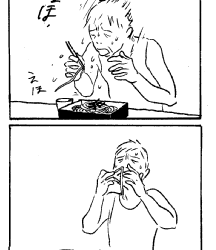
[This may not be the exact comic that Hiroi is talking about, but it's a comic Kui posted on her blog about someone eating soba through their nose.]
Kui: Oh, is that so? Isn't it something like "Shugaku Tenshi" [※4] ?
Hiroi: No, that's not true! The manga about eating soba noodles through the nose was made before "Shingaku Tenshi". By the way, that manga was planned to be published in "Rakugakihon" , but when I asked Kui-san "Can I publish this?", she was very against it...
Kui: No, that's fine, but... I didn't think other people would find it that interesting.
Everyone: (laughs).
Hiroi: But that was more than 10 years ago...
--By the way, was Mr. Hiroi the first publisher to contact you?
Kui: Before that, an editor at East Press had contacted me. I was originally publishing fantasy manga that I had drawn as a hobby on my personal website. I compiled them into a self-published original comic and exhibited it at Comitia, and they asked me, "Would you like to publish this long manga as a book?"
However, after the editor asked around to various people, it seems he was told that "this will be hard to sell"... so the plan was dropped. Instead, it was decided to release a "short story collection" of short manga that had been published at the same time . This is "The Dragon's School is on the Mountain: A Collection of Works by Ryoko Kui" published by East Press.
I was contacted by a few other people as well, but the two people I still keep in contact with are Mr. Hiroi and the editor at East Press.
-- When you went from drawing short stories and web comics to starting a commercial serialization, did you study anything like "how to draw a serialized work"?
Kui: I learned almost everything about how to draw manga from Mr. Hiroi and the editors and writers at Harta .
I had absolutely no understanding of whether panel layout was good or bad, so up until the middle of the serialization, I would rearrange the storyboards one panel at a time, and I would get lectured like "Don't put a panel like this here."
I was also impressed when I was shown original manuscripts by other artists. They look beautiful in print, but the real thing is even more impressive. This is what it means to be good at drawing manga.
It didn't finish as I expected
-- Speaking of "serialization," you mentioned earlier that you initially intended to end it at about volume 5. Did "Dungeon Meshi" continue longer than you had anticipated, Ms. Kui?
Kui: First of all, I didn't really understand what a "serialized" comic meant, so I didn't even know how much of a story I could get done in how many pages. So, I thought I could wrap up the story nicely in about five years, in five volumes.
But I never quite got around to finishing it. It was so hard... (laughs).
Hiroi: To be honest, when I first heard "Volume 5,"I thought to myself, "(Are you kidding me...?)" I didn't say it out loud though (laughs).
--Honestly, even as a reader, around the time of the fight with the Red Dragon in volumes 4 and 5 I was starting to feel like, "Huh? It seems like it's coming to an end soon..."
Kui: From the beginning, my goal was to "defeat the Red Dragon at the halfway point." However, I was supposed to fight the Red Dragon in Volume 4, even though it was supposed to be 5 volumes. So I thought, "Huh? It's not over yet," and I gradually lost interest.
By the time I got to around volume 10, I felt like no matter how much I drew, it would never end. I didn't want to drag it out, but no matter how much I drew, it just never seemed to finish.
Hiroi: Even from an editor's perspective, it seemed like Kui was getting very anxious from around volume 10 onwards.
-- Having finished the long-running serialization of "Dungeon Meshi," did you experience any changes in your mindset?
Kui: I think it was great to have the experience of learning that it would take 10 years to draw a story of this scale. And when I think about my lifespan and how many more works I can draw... it makes me dizzy.
Hiroi: I feel like I'm constantly fainting...
-- Ms. Kui, are there still any works you want to draw in your mind?
Kui: Not that much. But I love drawing manga, so I want to draw a lot. I don't know if I'll have the stamina to continue for another 10 volumes, but I want to continue working as a manga artist somehow.
But maybe... I don't think it will sell that well next time...
Hiroi: Stop! Don't say that!
Everyone: (laughs).
Kui: In that respect, "Dungeon Meshi" sold well, so I was able to draw what I had imagined to the end. Next time, I think it would be better to consider the opposite scenario of "if it doesn't sell" and make it shorter.
That's the next new challenge.
-- In addition to the expectations for your next work, do you feel any pressure?
Kui: In my case, the first collection of short stories I published was fairly well received. For a manga I drew for the first time, that's about it.
That was a relief, but at the same time, I felt that "Ideally, the reputation of my next work will also steadily increase, but there will definitely be ups and downs." If the reputation of the next work is bad, will I be able to continue drawing without getting discouraged? I realized that the "battle with myself" had just begun , and I was terrified when I read the first volume.
What game has cute illustrations, in your opinion?
Kui: This is a completely different topic, but you 've played SaGa Frontier 2 , haven't you? Aren't the pixel art in SaGa Frontier 2 really cute?
--The pixel art in SaGa Frontier 2 is...the best!
Kui: The illustrations in "SaGa Frontier 2" have such exquisite balance... if you try to express that in a picture, you can't reproduce that cuteness. It's like "exquisite head-to-body ratio."
-- In your opinion, Ms. Kui, are there any games that have cute illustrations?
Kui: The first one that comes to mind is definitely SaGa Frontier 2. Also, I still remember how cute the character designs were in Final Fantasy Tactics.
But back in the day, I used to trace characters from FF7 . I thought, "There are so many cool designs in the world..." (laughs).
Hiroi: Nomura (Tetsuya)'s drawings are amazing, aren't they?
Kui: I traced Cloud and Aerith on tracing paper and quietly said to myself, "So cool..." and got really excited. I noticed something while I was working on the "Dungeon Meshi" anime...basically, games and anime are made by many people, aren't they? So I always thought, "Many people must be giving various opinions to make them."
But when I got involved, I realized that one person's power is quite large. This was quite surprising. I thought that there were multiple people who wrote the script and storyboards, and that each person had their own responsibility, but... the power of one person is quite large.
──No matter how much the work is divided up, it's important to have a director or supervisor who brings it all together.
Kui: Yes, in the end, it depends on the power of the person who takes the lead ...
However, at the same time, I think that the division of labor between scriptwriting and storyboarding is something that would never be possible with manga. In the end, you have to create everything in one person's mind, so "bias" inevitably arises. So personally, I don't like the idea of it becoming a "world created in one person's mind."
Hiroi: However, not only in manga but also in novels, the individual author's personality is strongly expressed. I wouldn't go so far as to say "ideology"... but the person's way of thinking is strongly expressed.
Kui: Speaking of which, people who create games alone, such as indie games, are amazing.
It's often said that manga artists "come up with everything, from the art to the story, all by themselves," but I don't think they can compete with independent game creators who create the music, programming, and art all by themselves.
Moreover, even more than manga, no one can give their opinion until the game is completed. If you think about it that way, making a game by yourself is really a "one-man battle." At the same time, what I like about games is that there are quite a few "works that are not made with much consideration for cost" ... I enjoy it a little bit.
-- Do you ever think, "I want to make a game?"
Kui: I once bought RPG Maker , but it ended up being a complete failure... (laughs).
Everyone: (laughs).
Love for "classic RPGs" was a major influence on "Dungeon Meshi"
-- I'd like to ask you, Ms. Kui, since you play a lot of titles on Steam and other platforms, have you ever had any problems playing a game?
Kui: Simply put, a "game that doesn't work" is a problem (laughs).
This sometimes happens with games made by individuals on Steam... they don't have any reviews, so there's no way to deal with it other than contacting them directly. There have been a few times when I've been stuck and wondered, "What should I do?"
Other times, I'll buy a title that just happens to pop up at the top of Steam's rankings. Sometimes I'll play it thinking, "The graphics are kind of cute, so I'll give it a try," only to find that it's incomplete beyond the framework.
--So now people are playing titles that aren't that major.
Kui: Also, when I played Planescape: Torment, which is said to have influenced Disco Elysium.
While playing, I came across a character who was suffering from a terrible curse that made his whole body smell and become sticky. A quest was triggered to ask the NPC who had cast the curse to lift it, but when I asked them to lift the curse, I ended up being cursed with a curse that made me have constant hiccups ...
So when I was walking around the town, the "hiccup" dialogue started popping up all the time. What's more, every time it happened, I would freeze up for about 0.1 seconds. All the dialogue was filled with "hiccups." Anyway, it was a troubling curse.
I had no idea how to deal with this either, so I decided to just kill the NPC who had put the curse on me. The NPC also challenged me by saying, "Maybe if you kill me, the curse will be lifted?", so I tried killing him, but... it didn't lift the curse at all (laughs).
Everyone: (laughs).
Kui: I thought maybe the quest would progress in other places, so I walked around here and there, but the curse was not lifted after all. I was really curious, so I looked back at overseas information exchange thread online, and I found someone had written a lecture that said "You know what happens if you kill an important NPC without thinking about it, right?"
So I realized that this curse can never be lifted again. Even if I wanted to rewind, it was an auto-save, so I had to go back almost to the beginning... I was really... in trouble!
-- But "Planescape: Torment" hits a pretty impressive spot. Was it something that just happened to catch your eye while you were browsing Steam?
Kui: I originally liked games in the same genre as Baldur's Gate, so I think that's how I got into Planescape.
Also, I saw information that a huge amount of text in Planescape was translated by one person... I'm not very good at English, and games like Planescape have a lot of text to begin with, so I'm at a loss if it's not translated into Japanese .
However, when extraordinary people like those who make Planescape use their precious time from their lives to accomplish great things, I feel very grateful.
-- So, Ms. Kui, do you prefer games that are closer to the classics?
Kui: That's right. The first game I played was The Elder Scrolls V: Skyrim, and it was so much fun that I searched for "games similar to Skyrim" and played a lot of the games that came up.
All of them were completely different games from Skyrim, but they were fun. However, I don't like "old games". I think that newer games are generally more polished and well-made.
-- Wizardry, which influenced Dungeon Meshi, is also a classic work.
Kui: When I was a child, I saw my father playing Wizardry V : The Heart of the Maelstrom. As time passed, I remembered that there was a game called Wizardry. The game I played at that time was Wizardry VI: Forbidden Pencil.
I also played Wizardry V , but it was hard to see the map unless I chanted a spell. I was directionally challenged, so even though I had a guidebook at hand, I couldn't progress.
--By the way, were you more interested in making a manga out of "Wizardry" than the tabletop RPG "D&D" ?
Kui: When I was researching fantasy, "D&D" was often mentioned... but I had never even heard of "TRPG" before. First of all, you can't play it without friends, and I was shocked to find out that lots of people have friends they can play with like this...!?
Everyone: (laughs).
Kui: So when I looked up TRPGs on Wikipedia, I couldn't imagine that people actually played this kind of game. I was more confused and thought, "How can people really role-play in front of other people?"
After that, I watched replay videos on YouTube and it was only then that I understood how games like D&D worked.
Games, manga, novels. What is the purpose of all creative works?
-- What was the last game you played?
Kui: Recently I played a school management game called "Let's School." It's made by a Chinese company that also made "My Time at Sandrock."
Hiroi: You really like that kind of game, don't you? (laughs) Oh? Haven't you played "FF7 Rebirth" ?
Kui: I'm thinking about playing the remake of FF7 once it's completed.
Hiroi: No, no, if we don't do it now, we'll never finish it! It'll be a long time before we do it!
--Honestly, I also thought it would take about 10 years for FF7 Rebirth to be released.
Hiroi: I thought it would take about that long too... I really wanted it to be completed while I could still see. So, please do it!
Kui: Once it's finished...I want to play it all at once (laughs).
--Do you and Ms. Kui often talk about games?
Hiroi: Ms. Kui sometimes says, "I want to talk about this game, so I want you to play it." I played "Red Dead Redemption" because of that. Also, a long time ago, Ms. Kui recommended "13 Sentinels: Aegis Rim."
Kui: Whenever there's a game I want to discuss with someone, I always recommend it to Hiroi.
But maybe I haven't been playing games as much lately. Until now, I've been playing games because I thought of it as "for work," but now that the serialization of Dungeon Meshi has ended, I've been playing less games.
Moreover, I'm not the type of person who gets that into one game...I don't generally play through a game in repeated playthroughs, and I'm usually satisfied once I've finished the story.
Hiroi: Then we have to start [a new ] serialization soon.
Everyone: (laughs).
-- I'd like to ask you personally, do you have any "recommended indie games"?
Kui: I highly recommend "Papers, Please" and "Return of the Obra Dinn."
First of all, "Papers, Please" is a simple "spot the difference" game, so I didn't have high expectations at first. But when I played it, I felt like there was a proper "world" to it . Also, I was curious to see how the story continued.
And "Return of the Obra Dinn" had a great atmosphere. There were hints to solving the puzzles if you looked closely, but there was also a good balance of being able to force your way through, and the music and production were cool.
Hiroi: Come to think of it, you read quite a bit of the novel after the serialization ended, didn't you?
Kui: Ah, you mean "1984" by George Orwell? That was good...
I've always thought that creativity isn't necessary for life... It's entertainment, so it's not essential to life. But after reading "1984," I thought, "I guess creativity is necessary after all."
Humans need stories to experience things that should never come true, to prepare for bad things, and to prepare for understanding other people... You might think, "You should have already learned that when you were younger," but I was deeply moved by this realization.
Anyway, I feel that it would be great if people could learn things they didn't know before through this work.
Hiroi: ...Overall, it just felt like we had a fun time talking about games (laughs).
Kui: We just used the interview as an excuse to talk about the game (laughs).
-- No no, thank you very much for sharing your valuable story! (End)
I think I can understand a little bit about being interested in things you hate.
It's easy to analyze "why do you like something?" when you like it, but it's surprisingly difficult to analyze "why do you dislike something?" When you understand the reason, it seems that "why do you dislike it" is often more meaningful.
Perhaps creative works exist in part to help us understand the things we dislike.
I was able to hear a lot of deep "creation stories" that made me think about such things. Also, Ms. Kui is a huge gamer. Mr. Hiroi also likes games quite a bit. Since serious talk and game discussions alternated, the content may have been emotionally confusing. But I feel like "Dungeon Meshi" has a similar atmosphere.
If you haven't read "Dungeon Meshi," please take this opportunity to read it. It depicts a fun adventure. On top of that, it may help you prepare for difficult things that might happen in your life someday. Of course, it's also extremely interesting as a manga. I think it's definitely one of the best "entertainment" of our time.
Why does the body want to live? What does the mind want?
This is because we have a "desire" to pursue what we like and dislike. In fact, "things we dislike" are just as important as "things we like." By understanding our own "likes and dislikes" through creative works and entertainment, humans can prepare for things that happen in their future lives. Food and creative works are equally important for human growth.
...That said, I'm not sure if it has a nice punchline, or maybe not.
To eat. To experience creative works. These are truly the privileges of life. In order to live, we must continue to eat.
Now it's time to eat. What shall we eat today?
#dungeon meshi#delicious in dungeon#ryoko kui#kui ryoko#dungeon meshi research#translation#interview
1K notes
·
View notes
Text
2nd half of the Ruki interview (pages 2 & 3)
Ruki: "It's true that since SINGLES are singles, we feel like we're chasing the trends or something that reflects the times. The things we admire and like change all the time."
Interviewer: "The sound is dazzling, and there's an impression that you're really trying to be cool, Ruki. (laughs)"
Ruki: "By turning our feelings of 'I want to be like this' or our aspirations into singles, it helps define the band's direction. That said, there's a contrarian side to us. For example, after releasing a really pop song, we'd deliberately release something completely minor in tone. We didn't want people to think we were just a band that makes pop songs like Cassis, for instance."
Interviewer: "Like, 'Don't think you've figured us out so easily!'?"
Ruki: "Exactly. (laughs) So, it's like we're always going against the flow. Singles are inherently about being conscious of the times or pursuing popularity, right? But at the same time, there's something cool about being a band that can't be judged solely by that. I've always admired bands like that. And so, eventually, I even started feeling like we didn't need the single format anymore."
Interviewer: "Now that I think about it, you haven't released any singles recently. What do you think is reflected in ABYSS?"
Ruki: "I think it might be the closest to my true nature. It’s the kind of zone I tend to reserve for B-sides on singles—the ones where it’s okay if people don’t fully understand them."
Interviewer: "It makes sense, considering how introspective many of the songs are. It feels like we're seeing the deepest side of Ruki."
Ruki: "Also, from the perspective of a rock kid, I’ve always liked bands that included this kind of tone in their B-sides. I'm interested in what's hidden, not what’s on the surface."
Interviewer: "Why is that?"
Ruki: "It’s like that’s where the essence of the band is—where you get a glimpse of their true feelings. It’s the same for me. Don’t you ever listen to a song and think, ‘Why did they include this kind of track?’ And you feel like there’s some hidden truth there. For example, the single might be super upbeat, but the B-side is darker or more downbeat. If they’re deliberately doing that, you start to feel like there’s some kind of intention behind it."
Interviewer: "So, you want to touch on that essence."
Ruki: "Yeah, I like the feeling of, ‘What I really want to do is actually this.’ When it becomes an album, it allows that worldview to be expressed more fully, doesn’t it? I love that glimpse into what feels like the true essence of a band."
Interviewer: "What does the essence that you talk about refer to in emotional terms?"
Ruki: "First of all… it’s the parts you want to hide. Personal emotions, like how you feel when you’re at your lowest. It’s about whether or not there’s a sliver of hope in the midst of that weakness. It’s the kind of thing where anyone, when they’re feeling down, would think, ‘Yeah, this is just how it is to be human.’ Those real, raw parts."
Interviewer: "In the past, I feel like you didn’t show that kind of vulnerable side outside of your music. You came across as tougher, more defiant toward your fans."
Ruki: "Yeah, that’s true. Back then, it wasn’t like I was creating a persona or anything. I was just showing my naturally defiant self."
Interviewer: "In this release, that seems to align with LUCY, doesn’t it?"
Ruki: "But now, I feel like there’s no need to show that side of me on social media, you know? That’s something that can be expressed through music."
Interviewer: "Back in the day, you weren’t exactly kind to your fans either, were you? (laughs)"
Ruki: "That’s true. (laughs) My mindset was ‘If you don’t like it, you don’t have to follow us.’ That hasn’t changed even now, but instead of expressing it in words or attitude, I feel like it’s better to show it clearly through the music. That’s how I think about it now."
Interviewer: "LUCY really embodies that, doesn’t it? There’s a sharpness to putting it into words, but you’ve processed it through the music instead."
Ruki: "That’s how it is with things that are hard to put into words, right? For example, emotions like anger or thoughts that feel too intense or suffocating to articulate. Those kinds of feelings are better released through songs or live performances."
Interviewer: "Right. And with 20 years of the band’s history, it’s intertwined with your own life, isn’t it?"
Ruki: "Yeah, it is."
Interviewer: "So, you’ve also aged 20 years during that time. When you think of this best-of album as a compilation of that life, what kind of life do you think it represents?"
Ruki: "What kind of life… Well, compared to 20 years ago, I think I’ve gotten better at conveying what I want to do in the way I want, and I’m able to express things more deeply than I could back then. But I feel like the core of what I want to do hasn’t changed at all over these 20 years."
Interviewer: "What do you mean by 'it hasn’t changed'?"
Ruki: "Compared to 20 years ago, most people would naturally become more mature, I think."
Interviewer: "You don’t feel like you’ve matured?"
Ruki: "That’s what it feels like. The initial thrill I experienced with music and being in a band still hasn’t faded. It’s like I’ve spent 20 years figuring out how to translate that initial impulse into who I am now. To put it in a cool way, my sense of aesthetics hasn’t changed and it has carried me through to today. I’m talking about my mind, though."
Interviewer: "Usually, after being at it for this long, that initial thrill becomes something distant. But for you, it’s still close?"
Ruki: "Maybe it’s something people call the ‘chuunibyou’ (adolescent delusions). For most people, those early feelings fade and come back occasionally as a nostalgic memory. But for me, they don’t fade at all. I don’t even feel nostalgic about them. (laughs)"
Interviewer: "Hahahaha."
Ruki: "Of course, having done this for 20 years, I’ve gained more knowledge and experience, and I’ve gotten better at communicating and expressing myself. But back then, I was much rawer in how I did things. That rawness of my younger self is something I really want to preserve even now."
Interviewer: "So, it’s about not forgetting your raw self."
Ruki: "It’s not so much about not forgetting—it’s just that when I listen to music, I still think of myself back then. I think of the way to school, or the way home, and the dissatisfaction I used to feel about so many things back then. That's what music is to me."
Interviewer: "So that’s something that’s remained constant even after 20 years."
Ruki: "Yeah, and I don’t think that will ever change. Just because I’m an adult that doesn’t mean my music will suddenly take on a more ‘mature’ tone. But what I do want is to become better at expressing the dissatisfaction and despair I felt as a kid in a more delicate and profound way."
Interviewer: "People who continue to feel that way about music are what you’d call pure. (laughs)"
Ruki: "…Yeah, I’m totally pure. (laughs)"

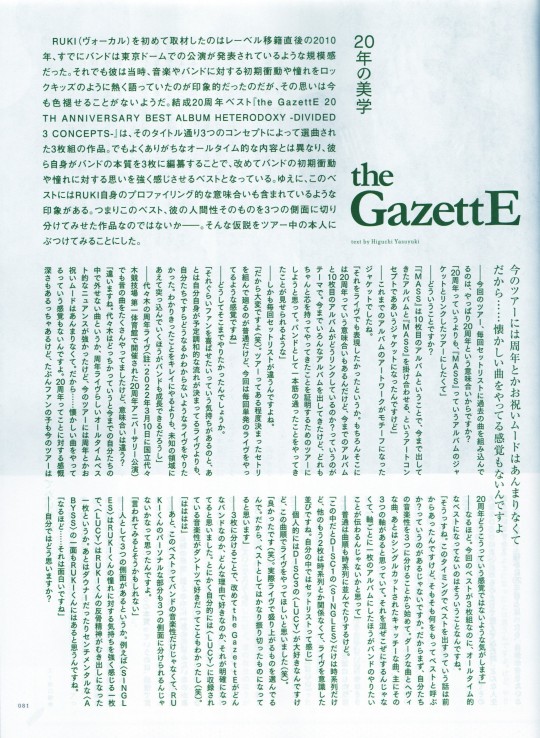
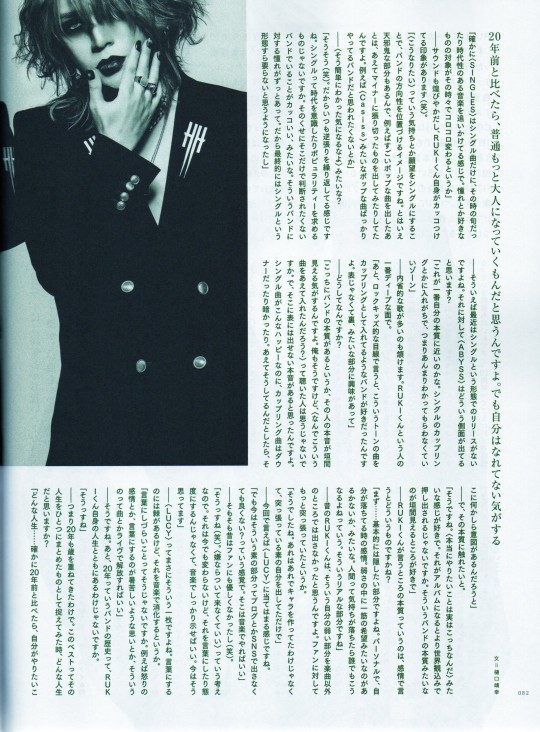

32 notes
·
View notes
Text

Ugaki’s influence on Majima’s character in Yakuza 0
#yakuza#like a dragon#rgg#ryu ga gotoku#yakuza 0#goro majima#majima goro#masayoshi yokoyama#hidenari ugaki#takaya kuroda#my translations#original#ugaki also mentions he was working part time as a hotelier so it was easy to step into the role in the dengeki interview#but i didn't have room for that lol
214 notes
·
View notes
Text

New picture of Ryan alongside a new interview ✨
#9-1-1#9-1-1 on abc#8b#911onabc#911 abc#ryan#ryan guzman#interview#photoshoot#it’s a bit weird?? but maybe it’s translated idk#outside of 911
290 notes
·
View notes
Text

This isn't a photo, but a screenshot (taken from the raw footage) that I love. We were in Mexico, maybe after the race in the pen. I swear I don't remember the details, but I do remember that Max was answering Sky Sports when Daniel, in his usual way, walked up and started chatting with him. At this point Max also asked him a question, so Rachel from Sky thought it best to give him the microphone and let him do the Ricciardo interview. We all laughed a lot at this point, but Max - being the out-of-practice reporter that he was - didn't hold the microphone up to record Daniel's answer, which the Australian tried to compensate for with strangely awkward hand gestures, and because Sky Sports didn't have a second microphone, I put mine in his hand. But two microphones, recording sound into two separate cameras, for two completely different countries' channels, was in fact a completely unnecessary process. This was when Max and I really started laughing, when he looked at me and realised that we had all run into the "microphone" forest. Good moment, I loved it.
Hungarian F1 reporter Ádám Szeleczky remembering this hilarious Max/Daniel interview from the 2019 Mexican GP | via
#that F1 media pen is never going to be the same without daniel's joyful and hilarious interruptions of interviews#maxiel#daniel ricciardo#max verstappen#mexican gp 2019#excuse my rusty hungarian translation - I am so out of practice lol 🙃
377 notes
·
View notes
Text
part 1 part 3
~ the Gazette - interview for Vif Music about the [NINTH] ~ part 2

◆ Album that the Gazette can release at the peak of the form (Reita)
- The thing created by such hard work, what are your impressions about it now, frankly?
REITA: It’s a good album. According to my feelings, it’s such you can just enjoy, rather than treating it as a sign work.
- It doesn’t look like you did it with enthusiasm.
REITA: Because in “Falling” you can feel the scale, but the whole album is not quite so pretentious. It’s easy to listen to, causes emotions, the range of genres is wide. I think the GazettE can release such an album at the peak of the form.
- Personally for me, interpretation of the album [DOGMA] only deepened for a long time, it was quite difficult to understand, and I agree when you say that the current album is easy to listen to. By the way, in the current lyrics there are words like «rubbish» or«guren» («NINTH ODD SMELL»), «gururi guru» («Uragiru Shita»), which vaguely resemble pieces of text or the titles of your previous works. Was it done on purpose?
RUKI: «NINTH ODD SMELL» - yes. We were originally going to make this song this way.
- In a recent release, you have decidedly focused on the past, and a thought crept into my head, if because of this you added live record “Boudouku Gudon no Sakura” in one of the album’s edition as a bonus, in which you raised the concept of the earliest period of your activity?
RUKI: It’s not quite like that.
- Well, then what the main idea Ruki-san wanted to enclose in the lyrics on this album?
RUKI: It is almost the same as always, I just wanted to tell about the moment “now”.
- The very “present time”, which already appeared earlier in the conversation. Is it possible to regard “Falling”, which came out beforehand and even with PV, as a symbol of the album?
RUKI: A symbol is a bit complicated. Rather to say that it is a prologue.
- As an entrance in the best sense of this word.
RUKI: Yes. Initially, it was such a representation that the image of the album comes with an intro, falls down on “Falling” and begins already with “NINTH ODD SMELL”.
- Previously, you looked like those who aren’t eager to touch the theme of lyrics, but this time, with the release of “Falling”, you immediately published and lyrics. Could it be that since the release of lyric video for the song “OMINOUS” in August 2015, you’ve changed the attitude to the lyrics?
RUKI: If we are talking about lyrics, then I most likely won’t answer if I am asked “What is this text about?”. It depends on the interpretation. For example, if I am asked: “And is "Falling” about a view of two lovers for love?», then I will answer: “Mmm … the essence is of course different, but if you see the text that way, I don’t mind.” I just said earlier that I don’t want to talk about this, but now I calmly answer.
REITA: Stop lying (laughs).
RUKI: Well, listen, I just think that if to say: “The lyrics is about this”, then the impression of the song at the same time will change.
- I was intrigued by the text "UNFINISHED”…
RUKI: Aah, I can not talk about this (instantly blurted out).
- I knew you it. (laughs).
RUKI: It’s not that I’m compared to other points of view, rather, I look at different points of view and write under the impression.
- I have a feeling that your lyrics haven’t been so straightforward for a long time.
RUKI: But I’m always straightforward. Perhaps it doesn’t look that way, because I do not say what exactly the text is written about. But even in the time of [DOGMA] from our position, we were unusually straightforward.
KAI: But [UNFINISHED] really seems very forthright. Not so much frank, maybe, but its text is easy to understand.
- It seems straightforward and honest.
RUKI: It is straightforward and honest.
- Don’t you think that the fans will also be surprised at such lyrics?
REITA: On the contrary, if you impose complex words on such a simple motive, won’t it be strange?
RUKI: (laughs)
URUHA: But the Gazette eventually became the band, which is surprising by the very fact that it releases such a song.
REITA: And when have we became. At some point, we were recorded in the ardent adherents of gloom. Annoyingly (laughs).
RUKI: And we used to have albums that ended in the same way?
URUHA: Nope, we haven’t.
RUKI: Seriously, we havn’t? (laughs)
- The mood, of course, is different, but in a sense this song with its frankness is reminiscent of [Miseinen].
RUKI: From the point of view of the lyrics, I didn’t put such a meaning into it, but in terms of the fact that it sounds very familiar, I understand you. There is probably that naivete in it.
◆ We tried even those equipment that we don’t have, and thus adduced melodies and parts of them to the most expressive progress. (Aoi)
- Working on “TRACES VOL.2” you made the mixing by yourself. And this time?
RUKI: This time, Uruha processed three songs.
URUHA: «99.999», «THE MORTAL» and «BABYLON’S TABOO».
— But last time you said you wouldn’t do it anymore.
REITA: It seems, it was still interesting.
AOI: Everyone was like “Let me! Let me!”
URUHA: (laughs) I did this in parallel with other work. If I had not been busy with mixing, I probably would have been free. Unlike working on ballads, the amount of work was quite different, and the drums were recorded from the real set, so the weight of the data was great …the drum mixing was the most troublesome.
KAI: But you did it well (laughs).
- You said that on “TRACES Vol.2” the hardest thing was to decide what to do with the low sound of the bass guitar.
URUHA: This time I was sent a bass with a wide range, and I inserted it without much pain.
REITA: During the recording this time there were a few moments, which did not fit either way. Playing on the instruments, depending on the way of playing, the outgoing sound changes, so in the middle of the night I sent him many messages in LINE to listen how it sounds better: if I play with my fingers or thumb.
to be continued…
original on vif-music
translation from japanese to russian by haruurara-kazan on tumblr
translated from russian to english by me
as always thx for reading and sorry for mistakes ^^
56 notes
·
View notes
Text
Club Zy 029 - Ruki interview excerpt (January 2016)

[...]
Interviewer: Do you come up with guitar riffs as well?
RUKI: Yes, I do. I always create riffs while playing the guitar; I don’t just program something that sounds like a riff. Right now, I’m practicing playing fast (laughs).
Interviewer: Really?
RUKI: It’s not like I want to play guitar solos or anything, but if I’m not good enough at playing guitar, I can’t perform the riffs or backing parts I imagine. If I can’t play them properly, I don’t feel excited when creating demos. Once you can play fast, it helps improve other skills too, right? So, recently I’ve been practicing fast picking quite a bit.
Interviewer: It's typical of you to not leave things to others, RUKI. Going back to UGLY, the lyrics depict a wicked woman, don’t they?
RUKI: When we were making this single, a lot of absurd things were happening. I turned that anger directly into the lyrics. It’s not about some imaginary wicked woman—it’s based on real events. At the time, I was so angry that it was impossible to write lyrics about anything else. I’m glad UGLY wasn’t tied to a commercial deal or anything (laughs).
That said, I’m not sure if I fully managed to express my anger. I struggled a lot with how to express my anger through words. Even though the lyrics are about anger, I didn’t want them to feel overly *murky. It’s like being absolutely furious, but at the same time, there’s a sense of laughing it off. It’s not about holding a grudge—it’s more like the ultimate form of being pissed off. In the end, I’m glad it didn’t turn into something like a curse song (laughs).
*ドロドロ (dorodoro) something sticky, murky, or dark, emotionally heavy.
[...]
Interviewer: DEPRAVITY is a cool song you’ve managed to create despite having little time. The lyrics of this track also depict anger toward absurd events, don’t they?
RUKI: Yes, it’s about one of the many absurd things that happened. So, it’s like 'Absurdity 1' and 'Absurdity 2' (laughs). However, when it comes to DEPRAVITY, there’s a sense of sadness to it—a kind of helpless feeling. That’s where it differs from UGLY.
Also, I only wanted to express the anger within myself, not explain what exactly happened. So, whether it’s UGLY or DEPRAVITY, I hope listeners vent their own anger and frustrations during these songs. Think of them as tracks for blowing off steam (laughs).
Interviewer: That’s a great idea (laughs). The third track, GODDESS, is a new direction for you—a powerful and emotional number.
RUKI: When I first heard the demo, I thought it was something very different from what the GazettE had done before, and it was really great. Once we decided to go with this track, I started by adding a melody to the chorus. I played it for Aoi, the composer, and when he gave it the 'OK', I worked on the rest of the parts with that direction in mind.
Interviewer: So, the melody for GODDESS was your creation, RUKI?
RUKI: That’s right. There was a sort of guide melody included, but I muted it and started from scratch. The melody for the chorus came to me instantly, and it ended up being used just as it was. For the parts where I got stuck, I’d unmute the guide for reference, but sometimes there was nothing there. It was like, “Ah, no hints here...” (laughs). That said, I did struggle in some places. There were moments when I thought, “I want this kind of melody, but the chord doesn’t fit...”
Interviewer: In cases like that, it’s common for the backing chords to be adjusted to match the vocalist’s ideas.
RUKI: Really? Please write that in bold (laughs). I’ve never asked anyone to change the chords. If I started doing that, then people might start asking me to change my parts, like, “Since you changed the chords back then, can you adjust this now?” (laughs). I’d rather avoid that, so I make a point of not complaining (laughs).
Interviewer: I see (laughs). Could you also talk about the lyrics for GODDESS?
RUKI: Following the anger in UGLY and DEPRAVITY, this song is about "living while carrying pain." These three songs are connected in a flow, almost like a concept album (laughs). The three songs were created around the same time, and by writing about my real feelings at that moment, they took this form. The lyrics of GODDESS are about how even in a life full of pain, there is salvation, and that to me is like a *goddess.
*女神 (megami)
[...]
29 notes
·
View notes
Text

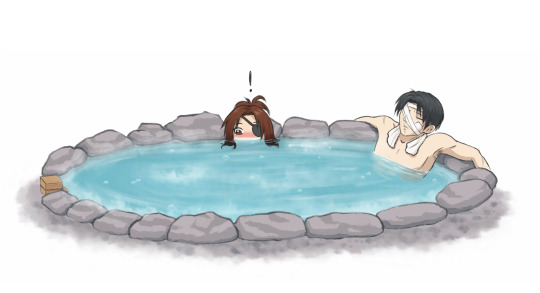

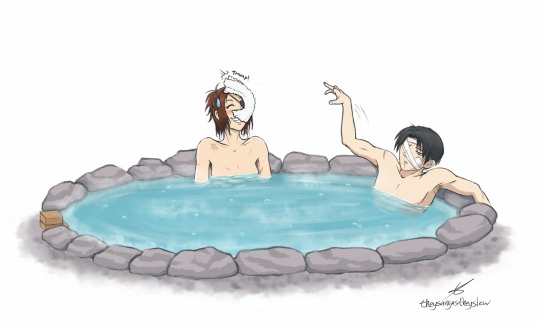
It's gotta be the reason behind this ⬇️ right?😂

I know everyone probably forgot about this release already but I sure didn't lol. Lord knows they both deserve a little pampering 🥰
#levihan#levi ackerman#hange zoe#levi x hange#hanji zoe#attack on titan#aot#shingeki no kyojin#snk#snk fanart#snk merch#also this may be fandom misinformation but!#apparently there was an interview where yams was asked about onsens in aot and he apparently said levi and hange went to one together?#idk i have a link to a video about it but its in italian so idk how accurately the info was translated#artists on tumblr#i maed dis#click for better quality
522 notes
·
View notes
Text
Shirahama Kamome interview at Desucon 2025, Finland
had the honour of attending her live drawing/interview last weekend, it was an absolute blast and i still cant really quite believe i got to see that. didnt win an autograph ticket, but what i did do was take notes from the panel, so if anyone's interested to read, here they are <3
feel free to share, but please credit :)
[] means stuff the panelists have said, () is me rambling









text version/ALT under the cut since it's a lot
14.6.2025 Desucon
guest of honour's program: Kamome Shirahama and the magic of drawing
disclaimer: might contain mistakes even tho i've tried to be as accurate to my notes and memory as possible <3
on the table she was going to be drawing at there were the usual 2 brushbugs wearing qifrey and olruggio's hats, but also a hattifatten
*a picture of shirahama's two brushbugs, wearing olruggio's and qifrey's hats, and a hattifatten on a table (from tongariofficial's twitter)*
the program schedule hadnt included a live drawing, so i dont know if that was going to be a surprise for us of if it was a last minute decision. shirahama said "unfortunately the hat is in the way of seeing", since she had the iguin mask on the entire time. since we had a lot of time, she would be drawing coco and qifrey. (i initially took this to mean she could draw them both since she had time but my friend interpreted it as being "BECAUSE we have time she will be drawing" so idk. she had a cool ring, which looked like it could hold ink or smth.
[did you read manga growing up and what were your favorite manga and mangaka as a kid?]
- like all kids she read manga, but also liked novels and movies
- her favorite were x-men and star was comics- she read manga that was maybe targeted to an older audience
[did you always draw as a kid?] (didnt write down this question but i think it was smth like that)
- according to her parents yes, and also she's drawn since she herself can remember
[when did drawing become your job?]
-she studied design (? and smth else idk i accidentally wrote design in english and finnish lmao) in university, and alongside that she got small jobs to draw atuff for for example teaching materials and games, and realised you could actually make a job out of drawing.
[what did you learn alongside your studies?]
- she had graphics as her major, but was also interested in accessibility design and something else (i think this had smth to do with the environment, maybe environmental design? but i had just written "something")
[how did you end up a mangaka?]
- self published manga drawings, and at some point a publisher reached out to her like hey do you wanna come draw for us
[what kind of material do you like to draw with?]
- the sketch she does with a pencil, and then the actual drawing with an inkpen- corona has chabged stuff a bit because you have to take into account how much can you meet with your assistants, so more of the drawing is done digitally nowadays
- she prefers drawing on paper, but for example if a design is going into a game (=onto a screen) she will draw it digitally to fit
- she's also been challenging herself recently by drawing more stuff digitally
[do you draw all the details in the sketch, or just at the inking part?]
- the pencil marks distract the drawing process, so she will add the details in the inking part
- "you are going to see it yourself with this"
[where have you taken influence from to your drawing style?]
- fantasy, rpg, europe (i think i meant western here??)
- okay so i had written "role-playing-game-styled" but idk what that rly means lol
- the style of wood carvings is medieval[your works have been published in maby magazines, is there a difference between magazines what kind of manga you draw?] (i think that meant her drawing style depending on magazine not the manga's story)
- it's not really the magazine that changes stuff, the drawing style changes depending on the story
- witch hat atelier is story-book-like
- style will accommodate what suits a game the best
[where does the style come from for each story?]
- no (???? what he fuck did i mean by this im sure it made sense in the moment)
- if it's a digital media, she will draw with a computer, a japanese story she will use a brush, and for a western story she will use harder pencils
[do you change your style depending on the target audience?] (more in the ways of a country a person is from, for example western/japanese)
- she will draw what will be enjoyable regardless of the target group/audience
[does your style change depending on the age group of your audience?]
- it's more in the language then, so the dialogue's difficulty changes
[where did you get the idea for enidewi?] (this just read "enidewi idea?")
- she likes european gothic angels and devils and wanted to write about them. there are a lot of things she likes in enidewi- she likes to tell stories with girls in them
(no idea what the actual question was, i just write "enidewi memories?")
- it's about 2 girls on trips and they get into shenanigans
- she has travelled a lot so she pulled stuff from her own experiences/stuff related to her own experiences
- she does hope that she hasnt been as much of a difficulty as those 2
[when did you get the idea for witch hat atelier?]
- she was thinking of it while drawing enidewi
- the idea has been with her for surprisingly long, 6 years before publishing
[were you imagining the story or the worldbuilding then?]
- no plot, but the setting, world and themes
[was the drawing part of magic in the story since the beginning?]
- it's been in the story since very early on
- there are some people who are incredibly talented at drawing in our world, but everyone can draw at least a certain amount, so she wanted a world where the magic is in everyone's reach so to say
[how did you design such an intricate magic system?]
- first she wanted a simple system that even a child could copy but wanted there to be some logic to add extra effects
[what is your favorite symbol?]
- the one coco uses a lot, meaning sylph shoes
[i think we would all want a spell to fly with our shoes]
- shirahama would want a spell to easy stiff shoulders (she was i think showing a v bad posture drawing position lol)
[too bad those are forbidden]
(no idea about the question here lol i missed it bc i was explaining the previous laughing to someone, she also had to read the question again from a paper she had so hell yea me too)
- the fears of how to get better at drawing
- there would be a feeling of relatability
[so the series has the "good guys" wearing a pointy brimless cap and the "bad guys" a brimmed cap, so a different philosophy means a different cap. where did you get the idea/why is it like this?]
- she was vaguely pointing at her iguin hat and doing the muscle flex pose like woo
- she cant say, and it will be revealed as the series progresses (she had her hands clasped at her chest i had written that down soecifically)
- wait with excitement for the upcoming chapters (i THINK she meant like any future chapter but tbh i for a sec thought the translator said NEXT chapter but dont get ur hopes up. ANYWAY WHAT THE FUCK)
(smth about the desig of characters again was distracted by the whole thing before)
- she think it's fun to make the character designs, it's it's becoming hard because there are so many characters
- she will sometimes go to her artist friends with a character idea like hey this is what this character is like what would they look like
[all the fans here would probbaly go crazy for a finland inspired outfit, what would it be like?]
- well it would be warm at least
[furhat]
[does qifrey's hat tell something about his character?]
- it's a modified version of his hat as Beldaruit's apprentice so not really
[how has it been like creating the rules within the world?]
- it's been fun thinking of the fashion styles and clothes (literally the note says "fashion styles and clothes fun so nice to make <nonsense> that was fun" so idk take of that what u will. the nonsense might have been "work" but i honestly dunno)
[what has been difficult to get to fit?]
- she says the weaknesses and holes are hard to work into the system so that it's noticable that things are wrong but not too much into either direction
- bring to light something about the differences in people ("bring forward motivation into that different people kinda" what. anyway not sure what i meant here, also not sure if this is still to the same question but i didnt at least write a question in this part so idk)
- she thinks a lot (about what, idk i think there was a question here too i missed about maybe magic?), magic is a technology that tries to make human lives easier
[do you intend to raise awareness of real life problems?]
- partially, and that magic is a positive depiction too so that might inspire to fix the real life problems[inspiration for witch hat during the creation of the series?]
- during middleschool/high school/university she liked lord of rings movies, and peter jackson films (idk if it was like she liked those during that time and they still inspire her or like was this just not answering the question but anyway)
[are there any spcific details inspired by other serieses?]
- ghibli, the idea of nausicae (? not sure about this but like those were mentioned)
[witch hat atelier is peculiar/unique with it's use of art deco. do the page compositions come to your mind as they will be or are they modified as you work?] (notes said to the first line just "wha unique, art deco" so i think that's what it meant?)
- there are both instances, some will be completed like they first came into mind, and others get elements and other stuff added while drawing[how does it feel getting recognition outside of japan too?]
- she is very happy about that, that people enjoy and read her stuff and she is very honoured overall, and it's nice that that's the case also in other countries
[reading pictures is pretty universal, is it kind of like the manga's magic that it's for everyone?]
- she said it's kinda of funny with japanese because kanji are pictograms so they are also pictures in a way
[so your series has an official spin-off called witch hat atelier kitchen. where did the idea for that come from?] (a lot of thumbs up from shirahama at the mention of kitchen yay)
- she was approached by the publishing like oh hey we have this idea to draw a witch hat food series is that okay with you[are you how deep in the creation process of kitchen, or is it just sato's work?]
- sato creates it, sometimes they might workshop some world related stuff, for example the names of vegetables, and how to connect kitchen with the main series more
[do you have a favorite character or do you love them all equally?] (she was looking between the translator and the audience and reaching for the brushbugs like tadaa kinda)
- brushbug is easy to draw so that's why, and especially drawn with a brush
[there's also a very cute hattivatti]
- she had bought it immediately after arriving to finland
[hattifattener are probably the closest finland has to a brushbug]
- "yeah that's how it is"
[you have worked with marvel, DC and star wars. how did this start?]
- she liked american comics and attended cons in the usa too, and showed some sketches for a producer/editor (idk the word but like someone in the industry)
[have you gotten to draw any of your favorite characters?]
- her first crush was wolverine
- she also like batman a lot
- she at least hasnt had the opportunity to draw them together in a work
- she draws a lot of female characters for her work usually too
[what's the process for cover art, do you get precise instructions or do you have more free hands with the design?]
- she gets mostly free reign, and does something to suit the character
- sometimes there will be instructions/asks to include something, for example if the story takes place in japan to put fitting elements there
[is there much of a difference working with foreign works compared to japanese ones?]
- not really, most differences depend on the work itself
[how much time do you get to making a cover?]
- she's been busy lately (👀👀👀) but usually the deadlines arent super specific, she will usually make one a month
[you worked in character design for the star wars: visions -series. how was the experience?]
- on top of all, the series is an animation, it was nice to get to work with other people
- also amazing to get to see her designs come to life
*a sneeze*
[do you have to take into account that the characters will be animated when making the design?]
- there wasnt as much creative freedom since star wars is a established franchise so a lot of the design elements already exist
- okay so i didnt hear if she said "you didnt have to simplify the designs" since it's animated or that "you did have to simplify the designs" so like uhhhh sorry for not being able to answer that :( i feel like it mighta been "you didnt really have to simplify" but oh well
[do you draw witch hat characters from a reference at the beginning until you memorize the design, or does the design change along the story?]
- she had made a few designs beforehand (i think this meant like of one character like a few versions)
[you also drew the comic adaptation for Star Wars: Visions. did you get strict rules for it of were you allowed to change stuff?]
- the story was completed so that wasnt changed- she kept the same visual spirit as in the animation
[is there a foreign work you would still like to get to work with?]
- a lot of eeeeeee pondering noices, she was holding her hand on her chin like when you think bout something
- she said it's a difficult question, but she would like to work with a tabletop rpg or boardgames (excited hand gestures)
[well im sure everyone here would at least love to play those]
- she mentioned she's done work with Pokemon cards and Fate/grand order
[there is a witch hat anime coming. what's your role in its production?] (excited hand gestures again)
- she says she checks the stuff the animators have done, and gives corrections if needed
- since the manga is black and white, she gived advice on the colourschemes, for example with what kind of coloring techniques the characters have access to and therefore what the clothes will look like
[is this the first time you've thought about the colours of some stuff?]
- there have been a lot, for example coco's dress in chapter 1
- she will ponder with the team what would work best
[how (much?) are you waiting for the anime?]
- "a lot, and also very excited that all of you will get to watch it"
[are there any serieses/games you like right now?]
- magus of the library (someone from the audience provided the english translation, the translator said "big wizard of the library" (in finnish). thumbs up from shirahama at that), it's very interesting
[well nice we're getting recommendations here]
[the world of witch hat atelier is rpg-styled, is there any videogame elements?] (something about videogames and witch hat world at least lol i kinda missed this bc of again the previous question)
- there's not really any video game elements, since there is no level ups or magic points
- more closer to fantasy literature
[you said you read manga before becoming a mangaka yourself. has making your own manga changed this hobby, are you tired of manga outside of work?] (many excited hand gestures again)
- she actually reads more manga now than as a kid- as a kid she didnt dare buy a lot if she didnt know the story that well (or like being way more cautious of what to buy), but now she feels like "she has permission" to read manga
- "oh it's part of the job i can buy and read manga"
[do you look back to your works and think a lot about what succeeded and could have been done better?]
- when she starts a new part in the series, she will read the previous one and think about what might have been left unexplained and try to broaden and explain the stuff later
[has the way you engage with and judge other people's manga changed after becoming a mangaka? do you think like "oh this could have been done differently" "oh this was really cool"?]
- she said she isnt "skipping school" when reading, she does look at novels too with new eyes now
[is it good to read others' fantasy works, or do you do it just because you like it?]
- she does keep up with what other people are writing, and says it's good to know what's going on so as not to write absolutely similar stuff
[oh it does look like the drawing is finished now.] (this was 12.17, the panel started at like 11, a few minutes over most likely)
- you could really see how she added the details with the ink pen and not with pencil (dont remember if this was shirahama or the panelists, but still so true and amazing to watch)
- "i erased the pencil marks out of the way"
- "thank you for having the patience to watch me draw"
[well this is going to turn into a thanking contest but i do think the pleasure is completely ours/thanks are completely on our side, thank you for drawing for us] (literally no thank YOU tetia core interaction)
[does anything come to mind that the finnish manga and anime -fans would be interested to hear that we havent realised to ask?]
- "thank you so much", she says it's nice to feel that people like the same stuff as she does, that even if we're from different countries that we are all fans of manga
[how has it been visiting finland for desucon?]
- she arrived a few days ago in helsinki, and the food and weather has been very good (this is hilarious she managed to come here on the 4 consecutive days when it's been sunny and so warm and not raining at all this whole year i feel like what. anyway glad she liked the food yayy)
- she still hasnt had time to properly visit desucon yet
when she left the stage she waved the hand of the brushbug that had oru's hat at the audience <3
#wha#witch hat atelier#kamome shirahama#interview#desucon 2025#i wrote the notes basically blind since i wanted to watch the drawing and it was pretty dark in the audience#so like it's a miracle my handwriting was at all legible lmao#i thought it would look suspicious if i was on my phone since you werent allowed to take pictures so that's why handwritte notes#anyway translating these into 1. coherent text and 2. english took me like 4 hours lol this was 4 A4 worth of notes#tbna#tongari boushi no atelier#still insane about the “oh lol read more and you'll find out” WHAT THE HELL THAT WAS SUCH A SIMPLE QUESTION#like that woulda been the last question i'd thought would be a plot point#goooooooooosh#villasukat.
156 notes
·
View notes
Text
Peterpan's Interview for iQIYI Exclusive Reset Special Clip 2 - English Translation
(Chinese, Spanish, Korean, Vietnamese subs available on iQIYI) note: this clip isn't the full interview, just a highlight, you can watch the full interview on iQIYI, translation may contain inaccuracies.
On Thada's personality
Khun Thada is a calm, profound, and mature person. On the outside, he seems to appears cold, but when it comes to love, he has something very innocent and adorable about him, with a little bit of warm "oppa" vibes. His expression when he's with others is often like him wears a thick protective armor. But when he's with Armin, Thada appears somewhat smaller [t/n: Pan uses tua lek lek so he's trying to describe how Thada softens up like a cute smol guy when he's with Armin]. Armin is someone who can make him smile more easily, one could even say, more than anyone else in this world.
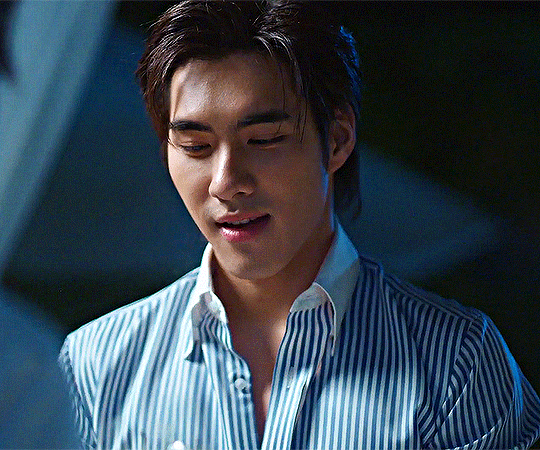
On his feelings when receiving the role of Thada
Pressured. Really really pressured. Pressured from the moment I knew this series was adapted from the novel Reset: The Star's Rebirth of author Crystaljade. And knowing it had millions of views made the pressure even greater. Actually, credit must also be given to the film crew. Why? Because the crew members knew that Thada and I are really quite different, whether in terms of age, personality, emotions, or lifestyle and everything. From a child who's just over 20, I had to "leap" to become someone nearly 40 years old, with my own company, a CEO, having to run an entire company. Plus, he also has a knot in his heart that he has been through a lot with. I had to do a lot of homework. The reason I said I have to thank the film crew is because they... every time I came to the set, if there was a heavy scene that day, to keep the character, not to break character, they always tried to help me immerse the world of Thada and Armin. I had to adjust my character to be more mature, speak slower, be more confident, when sitting, I had to straighten my chest and shoulders. Because almost 95% of the costumes I wear in this series are suits. Always having to look "smart", always having to be "cool." Therefore, to truly reach the deepest core of the character, from the external appearance to understanding the story behind it, everything is connected. This is something I always have to continuously adjust. Actually, even now, even though filming is done, Thada's personality is still within me. It has partly helped me mature. Thank you, Khun Thada.
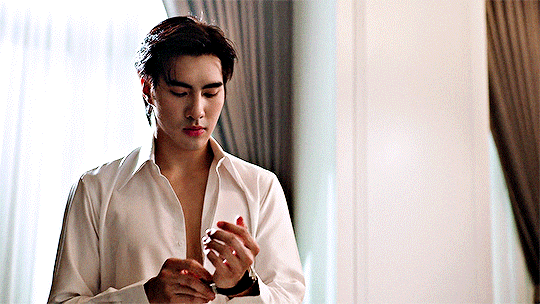
On stepping into the role of Thada
Being a fan - someone who loves another person wholeheartedly, I wonder what that person would be like. So I started trying to observe my surroundings, starting with the people around me. Starting with noticing my own lovely fan club, "Tinker Bell House of Peterpan," or even the fanclubs of all the actors in this series. I tried to observe their loveliness, their support. Tried to put myself in that mindset. Another thing that clicked with me very strongly that I myself only realized not long ago. I feel that when I was little, when I loved a cartoon character, for example, I really loved Toy Story. Last year, when I went to Disney[land], when I got to meet the Toy Story characters right in front of me, tears just started falling down my face from emotions that I didn't even realize. Then I felt perhaps this is the feeling of being close to someone, and that person sees me, they acknowledge me, so that makes me feel like I understand what it means to love something with all your heart. I tried to put myself in that place. Using that to adjust, to apply to how Thada supported Armin from the very first day he met this person.
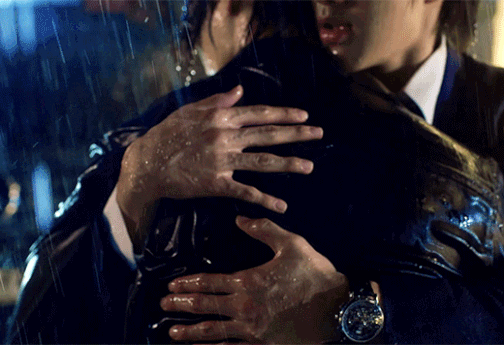
On different personalities in each part of the story
Yes, there are. When I got the role of Thada, his personality was already partly different from mine. When vieweing his exterior, one will see a certain personality of the character Thada. But when it comes to scenes that require a certain cuteness, I also had to find the character's personality in that direction. Here, credit must be given to the director, who always adjusts Thada's character to fit the script, while still adhering to the original identity/spirit of [the character in] the novel. [If you asked] whether it was difficult or challenging, there was a little bit. Because Thada must be calm, mature, but when he meets Armin, who always flirts and teases him, comes knocking on the door of his heart. If you imagine it cutely, it's like a kitten or a puppy rubbing up against you. And how do I react? It's like having to keep myself from a high position like this, "Mr. Thada" of Crown Enterprise and then [his walls are] gradually be broken down little by little. I always have to do my homework for that. That's right.
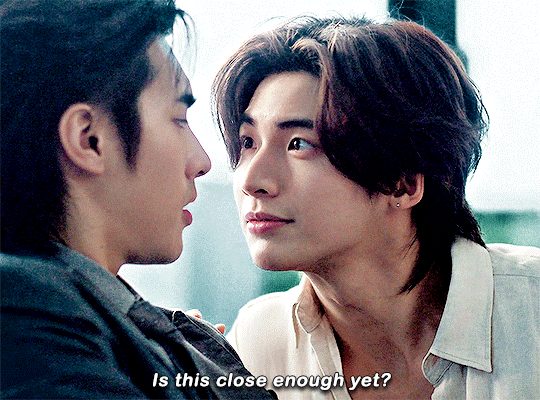
On the first collaboration with Pond Ponlawit
So, which aspect should I talk about? The first time we met was in acting class. From that moment when I met Pond, I immediately felt that this person had some kind of glow on him (t/n: Pan uses แสง so the direct translation is light but glow or aura feels more apt in this description). He has passion, he has determination in everything that he does in his life. Especially regarding acting, how he develops himself to embody his character. Or even his seriousness towards his everyday life. That made me feel that when I met him like this, it really impressed me from the very first meeting.
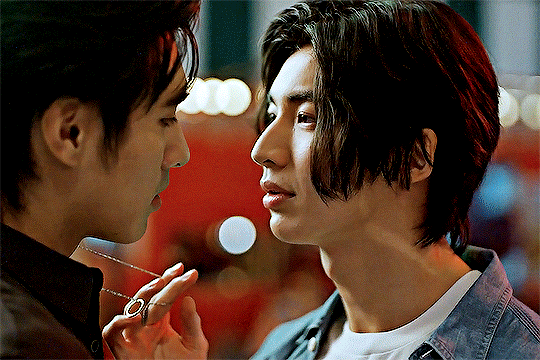
On his feelings when acting with Pond, any impression of Pond
Pond is someone who is a very hard-working person. He works hard when working, and plays hard when playing. He has a very good source of energy. On filming set, everyone wants to be near him. He gives off the feeling of a little puppy, which makes me see the professionalism in him even more. One could say he is one of the most prominent actors of this era, like in respective to fellow peer within his age. This is something that impressed me greatly. When we worked together, it motivated me to develop myself even more. This is a person worth following, Khun Pond Ponlawit. You're awesome! Seriously!
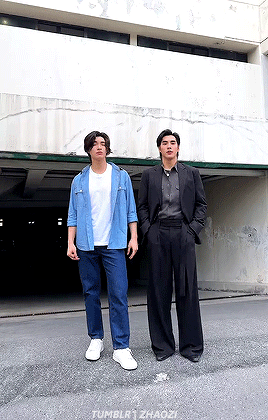
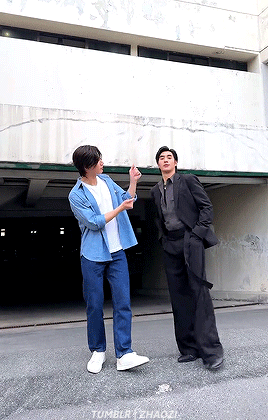
On any memorable scenes for him
Oh! That's a difficult question. I can't choose, there are so many. I find every moment meaningful. There are many moments that I want everyone to watch. I want everyone to see the simplicity, the rawness of the characters in this series. The fact that we get to sit and chill chill with someone, I find those moments lovely, even more important than the grand moments in life.
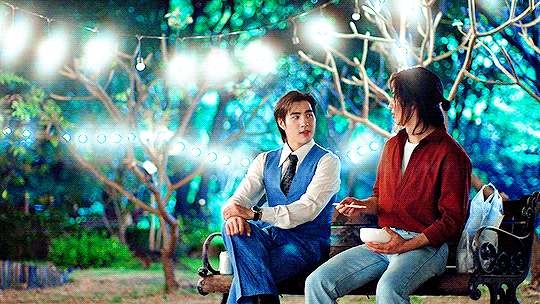
Behind vs On Screen
If everyone watches our behind the scenes, they will see that behind the camera, many people might ask themselves: "Huh, is this the same person as the one in front of the camera?" Because in our series, there might be some very serious scenes. Therefore, the way for both of us to relax after filming that scene is to play around with each other after such scenes.

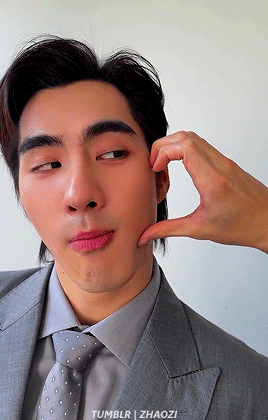
Anything Pan wants to share about or with Pond
Let me talk a bit about his cuteness. Pond is a person who is very disciplined in everything, even when it comes to his eating. When he doesn't have a filming schedule, he has a disciplined eating habit, which is to "eat wholeheartedly." That's his joy. But when he has to appear in front of the camera, like he knows that there's a scene that week where he has to show his physique, then oh my, he's extremely strict with his diet. But, once that scene is over, he eats deliciously. That's a moment when I saw it, I felt that if you eat and you're happy like that, then I'm happy too. One day, there was chili paste and mackerel, and also fried vegetables. Because he's like a Singaporean boy, like an international school kid, doesn't eat much Thai food, so there are some dishes he's never eaten, like fried vegetables, for example. He tried a bite and said: "Hey, it's pretty good." The bowl that was initially filled to the brim, he was like, "I'll have another bite," and ended up eating the whole bowl. He even took his manager's portion and kept eating. This is his cutesness. He's the type of person who makes eating look delicious. Looks quite adorable.
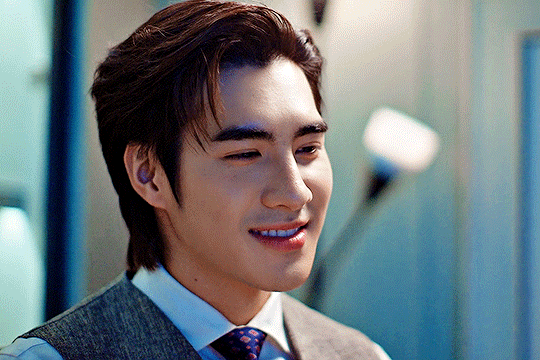
On Pond as his acting partner
I feel that Pond is a really great partner in this series. No matter what scene we act together, no matter how intimate the scenes are, we always talk to each other, always ask for permission from each other beforehand, and then together give our best in every scene. In the later stages, I felt we almost didn't need to think about what Armin and Thada had to do anymore. We even improvised more, like this is what Armin and Thada would want to convey, for everyone to see the loveliness, the depth in the characters' personalities. Which sometimes is even far different from the novel I have read. That makes me feel that I can keep going. I believe in the skill of Teacher A Natthaphong Wongkaweepairod (the director) and my partner Pond. Pond... my Pond. Oh, ah, Armin of Thada.

#reset#reset the series#pond ponlawit#peterpan tadsapon#resetedit#clairedgifs#usersasa#userrain#rinblr#esmetracks#userspring#userrzey#usertorti#tobelle#tsuservic#resetep2#userjamiec#usertaeminie#userrlaura#tuseralexa#rosytracks#userbenka#userpharawee#userspicy#uservix#i mean i'll do the pond interview too but that one pond has some harder questions so i wanna take the time to do the translation justice#so here you go. if you need a reason to get iqiyi vip. let these contents be the reason
163 notes
·
View notes
Text
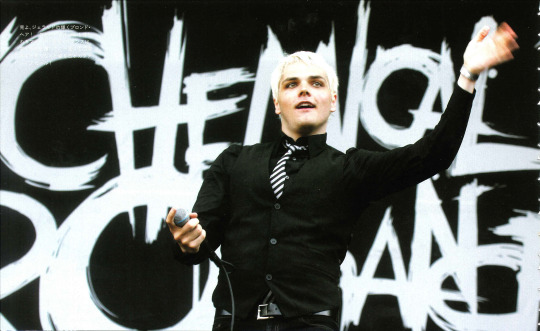
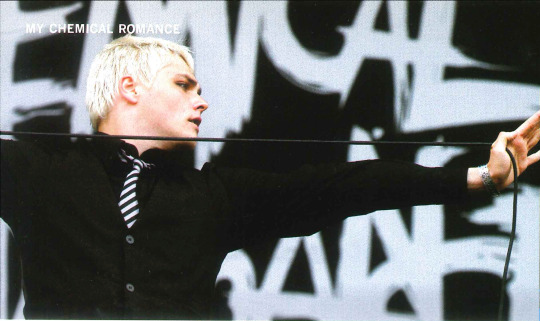
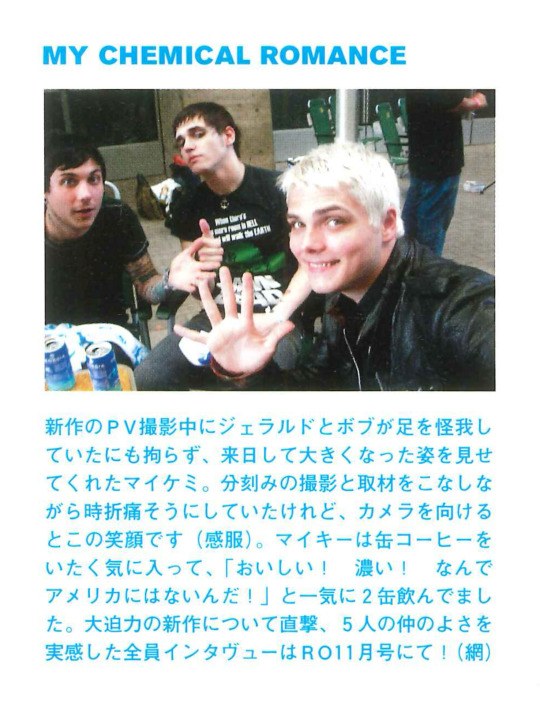
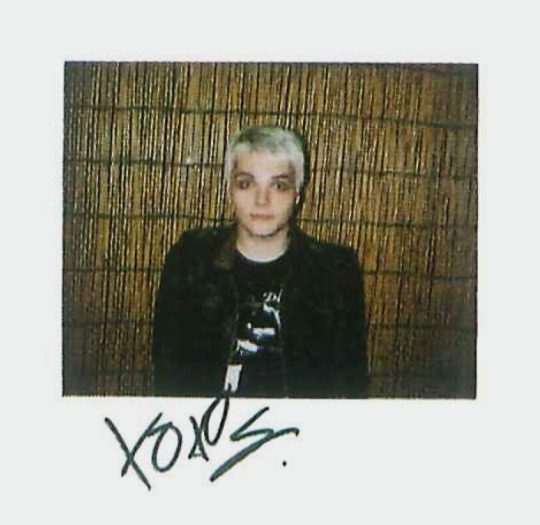
I rushed into the arena for My Chemical Romance, and found the front of the stage to be extremely crowded, humid, and hot. I looked up at the new band logo and was moved. Then, as the band appeared and suddenly played “I’m Not Okay”, I nearly fainted and was pushed out of the circular mosh pit, but somehow managed to hold on. My Chem’s second time at Summer Sonic was a rare stage appearance, coming just after they had finished their long-awaited new album. And as symbolised by Gerard’s dazzling blond hair, they loudly proclaimed the beginning of a new chapter. Mikey, the bassist, who has taken off his glasses and looks more manly, moved fiercely around like a different person, while Frank the guitarist seemed to concentrate on his playing more than usual. Ray’s guitar sounded sharper, and Bob’s drums roared with his long bangs blowing in the wind. Two new songs were performed that day, the first of which was “Dead”, a dance-inducing number with a riff reminiscent of the first album’s ��Headfirst For Halos” (Gerard's comical movements were also great). “House Of Wolves”, following the same beat as the first song, felt like a new frontier with its glamorous and dramatic development like a musical. I enjoyed the bliss of listening to a new song live for the first time, fully activating every cell in my body to take in the melody and lyrics that I will continue to listen to and sing tens of thousands of times in the future. After explaining that he’d decided to quit drugs after Summer Sonic two years ago and was grateful to come back clean, Gerard said, “Arigato.”Despite injuring his leg while shooting a new music video, he ran from one end of the stage to the other to speak to the audience. The sound they played, reborn and standing on the Summer Sonic stage again, was full of confidence and pride. That’s why “The Ghost of You” was such a grand song that had so many people waving their hands from side to side, and “The Jetset Life Is Gonna Kill You”, which was performed live for the first time in Japan, caused a wave of simultaneous jumps and shook the stadium. And when the last song, “Helena,” ended and the whole venue responded with screams to Gerard’s words, “Sing it as loud as you can to reach the heavens!”, my heart was beating so fast that I couldn't wait to see the new world that My Chemical Romance will show me.
Even though Gerard and Bob had injured their legs while filming their latest music video, My Chem still came to Japan and showed us how much they've grown. They looked like they were in pain at times as they went through the minute-by-minute filming and interviews, but when the camera was pointed at them they smiled like this (impressed). Mikey liked the canned coffee so much he drank two cans in one go, saying, "This is so good! And strong! Why don't they have this in America!" We asked them about their powerful new work and got a real glimpse of how close the five of them are in the November issue of Rockin'on!
my chemical romance in rockin'on buzz, october 2006 / summer sonic, tokyo (x x) ph. 1 & 2 mishima takayuki, 3 & all text amida yukiko
#my scans#bands#my chemical romance#frank iero#mikey way#gerard way#tbp era#rockin'on buzz#summer sonic#tokyo japan#interviews#eye contact#socute :)#my translations#i. hope this format is understandable#i dont know how to format all this stuff w the translated text
184 notes
·
View notes
Text
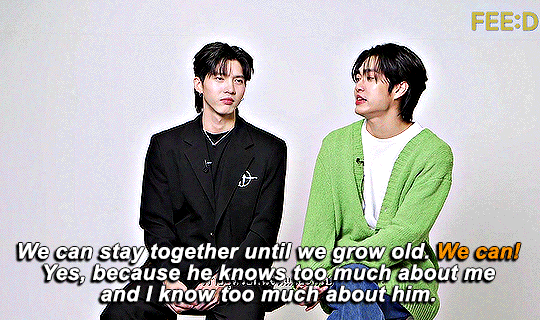
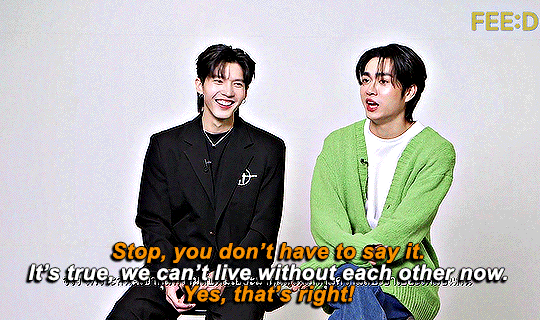
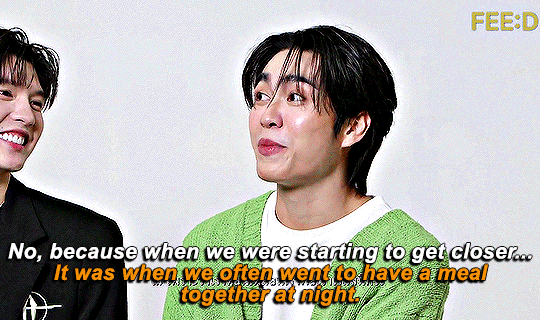
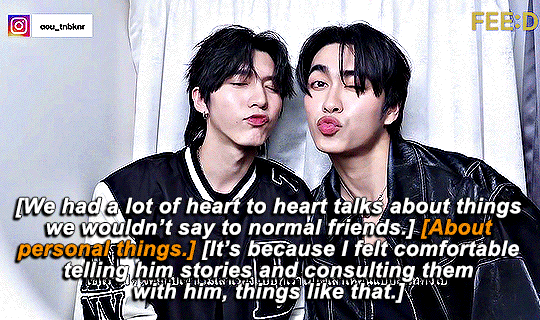
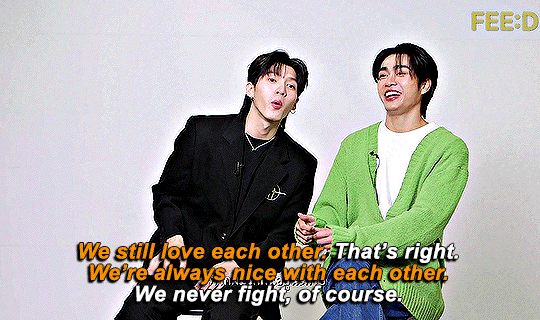
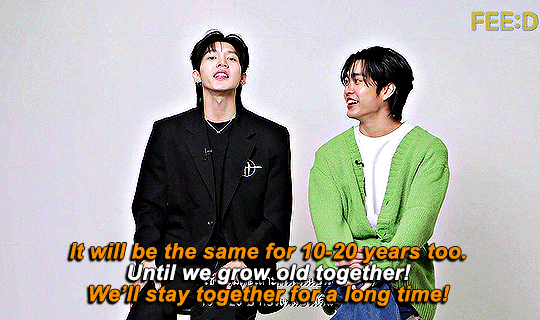
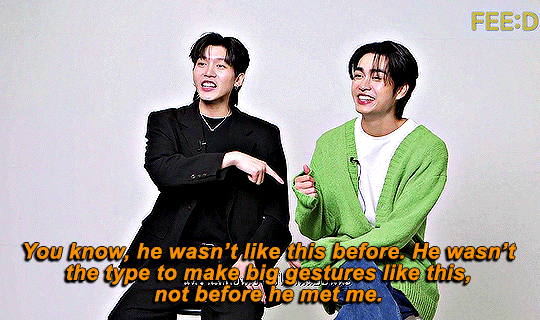
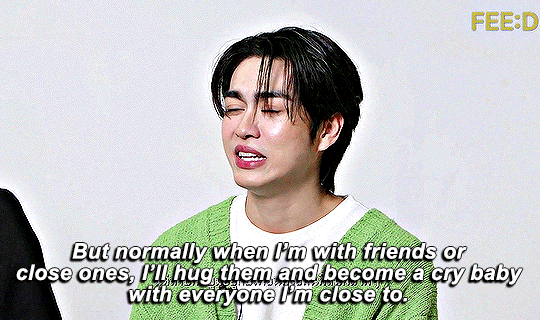
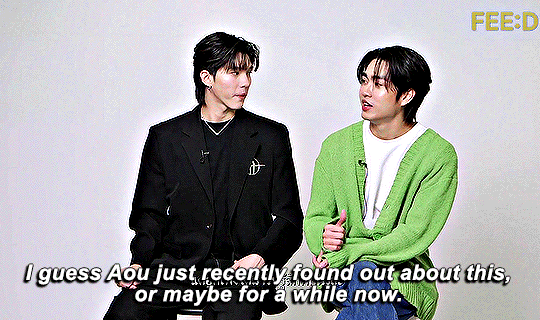
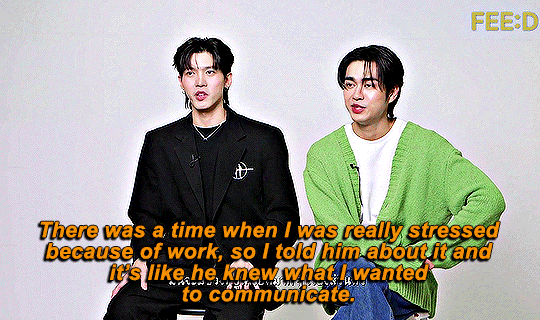
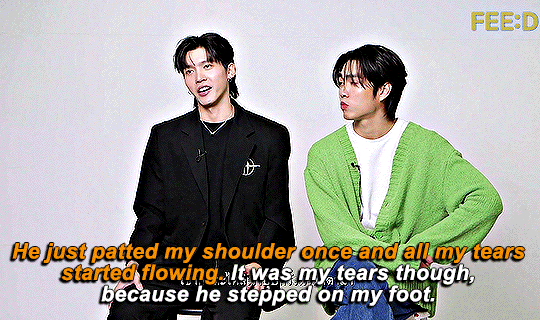
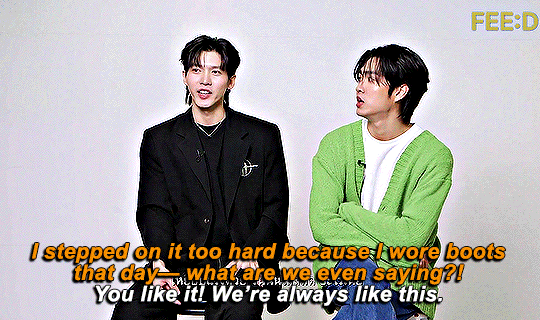
AOUBOOM'S WORKING GOALS 🌼🧸 #FEEDxAouBoom | translation cr. ©
#aouboom#aou thanaboon#boom tharatorn#we are the series#we are cast#lana.gifs#aouboom.gifs#tw: flashing#huge thanks to ree for the help with identifying overlapping voices + added pieces + translation adjustments 🤍🩷#might gif more from this interview because there's really so so much worth the work#definitely a recommended view for my fellow aouboom peeps by the way in case you missed it#color legend: orange is aou & white is boom
657 notes
·
View notes